#the duality of good and evil continues
Text
So basically it’s been confirmed that whenever we see Tissaia with her hair down, it’s because something unspeakably awful is going to happen seconds later.
#tissaia de vries#yennaia#witcher season 3#witcher season 3 spoilers#vilgefortz bed scene and now this...i can't even#the duality of good and evil continues#so beautiful so ethereal and then...and then...#seeing her with her hair down was not worth the price both times around 😢
146 notes
·
View notes
Text
South Asian and Hindu Influences in ATLA (Part 1)
disclaimer: i was raised culturally and religiously hindu, and though i've tried to do my research for this post and pair it with my own cultural knowledge, i'm not an expert on hinduism by any means. should i mess up, please let me know.
please also be aware that many of the concepts discussed in this post overlap heavily with religions such as buddhism and jainism, which might have different interpretations and representations. as i'm not from those religions or cultures, i don't want to speak on them, but if anyone with that knowledge wishes to add on, please feel free.
it's well-known that atla draws from indigenous, east and southeast asian influences, but something i rarely see discussed in the fandom is the influences the show takes from hinduism and south asia, and there are actually far more than i think people are aware of.
so here's a (non-exhaustive list) of the main inspirations atla drew from south asian culture and hinduism, starting with...
The Avatar
the title of the show itself is taken from the ancient language of sanskrit, often considered the sacred tongue of the hindu religion. in sanskrit, the word "avatar" means to "descend" or "alight".
the concept of the avatar is a very old one, referring to the physical incarnation of a powerful deity or spirit. the idea of the avatar is most often linked to the god Vishnu, one of three supreme hindu gods collectively called the trimurti, or trinity. the avatar is said to manifest upon earth primarily in times of great need, when balance must be maintained between the forces of good and evil.
atla borrows heavily from this idea in having aang be the incarnation of a divine spirit who returns to the world during a time of immense strife, and is tasked with defeating a great evil to bring balance back to the world. and though i don't know if it was an intentional reference, it's interesting to note that Krishna, the most famous incarnation of Vishnu was also reborn amidst a fierce storm and carried through a raging sea to a new home where he would be protected from the king who sought to kill him. sounds a little familiar, doesn't it?
Agni Kai and the Philosophy of Firebending
the word "agni" derives from the sanskrit name Agni, the god of fire, though it can also generally mean "fire".
the concepts of lightning bending and the sun being the source of firebending are likely also taken from the idea of Agni, since he's said to exist simultaneously in three different forms on three different dimensions: as fire on earth, as lightning in the atmosphere, and as the sun in the sky.
Agni is a significant aspect of many rituals, including marriage rites, death rites, and the festivals of holi and diwali. the concept of Agni is one of duality: life and death, rebirth and destruction. hindu rituals accept and celebrate both aspects, revolving around the idea that destruction is not separate from creation, but rather necessary to facilitate it. the cremation of the dead, for instance, is seen as purification, not destruction: burning away the physical form so the soul is unencumbered, set free to continue the reincarnation cycle.
this influence can be seen in the firebending masters episode, which discusses the idea of fire being vital to life. the sun warriors safeguarding the original fire and demanding that zuko and aang bring fire to the dragons as a sacrifice could also reference the ritual of Agnihotra - the ritual of keeping a fire at the home hearth and making offerings to it. the purpose of this ritual differs depending on which text you refer to, but it is generally believed to purify the person and atmosphere in which it is performed, similar to how zuko and aang must make offerings to ran and shaw and survive their fire before being deemed worthy and pure.
Agnihotra is said to serve as a symbolic reminder of the vitality and importance of fire as the driving force of life, a lesson that zuko and aang also internalize from their encounter with the dragons.
Bumi
bumi's name is taken from the sanskrit word "bhumi", which means "earth". it's also the name of the hindu goddess of the earth, bumi or bhudevi.
one of the things the original animation didn't do and which i really enjoyed about the live action was that they made bumi indian and added desi inspiration to omashu. it makes perfect sense for a king whose name is as hindu-inspired as they come.
NWT Royal Palace
chief arnook's palace in the northern water tribe takes inspiration from the gopurams of hindu temples, massive pyramidal structures that served as entrance towers to the temple.
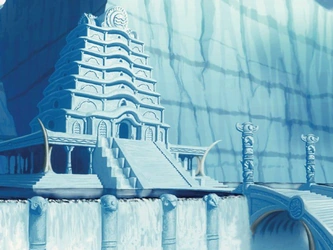
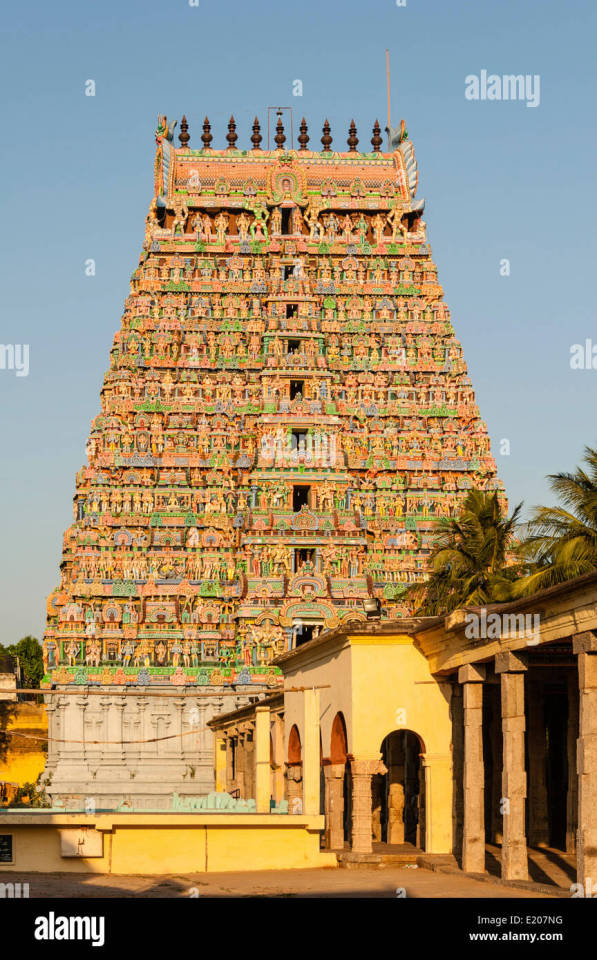
gopurams were built tall enough to be seen for miles around, beacons to signal tired or weary travellers who wished for a place to rest that a temple was nearby. it's a nice touch that the chief's palace is located in front of the spirit oasis, a similarly symbolic entryway to a sanctuary housing otherworldly deities.
Betrothal Necklaces
to preface: i doubt this was an intentional reference, and this great post talks about other cultures that could have inspired the water tribe betrothal necklaces. given the desi influence in the nwt architecture however, i figured it was worth mentioning.
the idea of betrothal necklaces being given to women by their male partners is similar to the thaali, a necklace given to hindu wives by their husbands. during hindu weddings, grooms tie the thaali around their brides' necks to symbolize their marriage. once given, wives are expected to wear their thaali till the day they die, as doing so is believed to bring good luck, health and prosperity to their husbands.
Chi-Blocking
though chi-blocking takes primary inspiration from the art of Dim Mak, it is also influenced by the south indian martial arts forms of adimurai and kalaripayattu, both of which include techniques of striking vital points in the body to disable or kill an opponent.
kalaripayattu also shares parallels with firebending, being a very physically demanding, aggressive martial art that emphasises the importance of discipline and mental fortitude. control of the mind is essential to control of the body, a philosophy similar to that espoused by iroh across the show.
Wan Shi Tong's Library
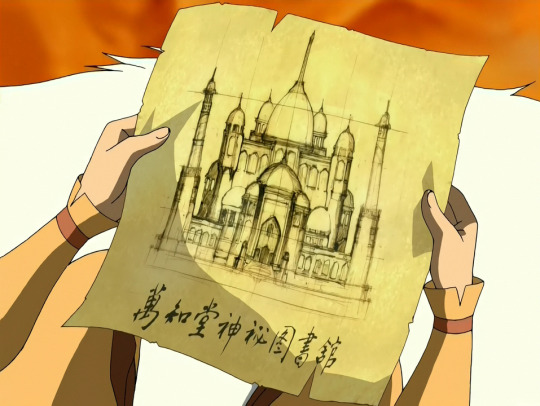
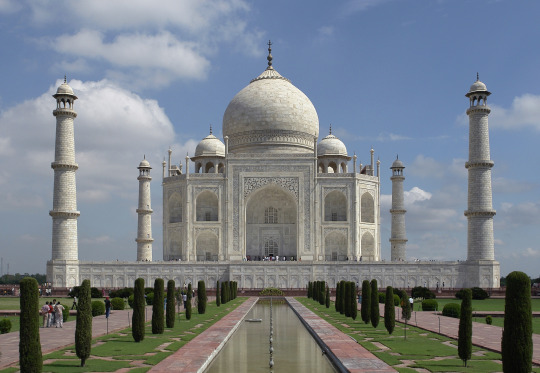
the library draws inspiration partly from the taj mahal, the famous mausoleum constructed by shah jahan during the mughal empire as a monument to his beloved wife, mumtaz mahal.
i'll end this post here since it's getting too long as it is, and the following section will be even longer. for while atla treated the concepts in this post with respect, the same unfortunately cannot be said for its depiction of guru pathik and combustion man - both of which we'll be discussing next.
765 notes
·
View notes
Note
Please write your thoughts about the importance of Shadowheart for Shar/Selûne :D
I FEED on character analysis.
SO!!!! This got long as fuck and also morphed into what you asked + a general character interpretation.
I relied on a combination of 2nd, 3rd, and 5th edition D&D lore, R.A. Salvatore novels, and of course BG3 as sources. Shadowheart's characterization adds up the most coherently on the purely romance / "get her away from Shar" path, and that is what I'm using as a basis for this post. Even when you're playing an "evil" route, she behaves in ways that betray a lot of what I get into under the break. This post, however, is biased towards the "good" path of her personal quest for the sake of my sanity and a somewhat reasonable word count.
First, a preamble for people that are maybe less knowledgeable about Forgotten Realms lore.
One of the biggest characterizations of Shar and Selûne in the Forgotten Realms is that they are twin sides of the same thing: night. Night as an aesthetic is symbolic of, among other things: mysteries, being lost without guidance (such as in faith or purpose), and finding oneself when one reaches for the truth. I.e., reaching light from the moon, stars, or daybreak (which is itself a symbol as the natural conclusion of darkness being light for redemption following suffering, goodness defeating evil, finding faith, etc.)
Shar and Selûne are sisters that also share the Night domain in 3e, a sort of fulcrum they both work around — Shar as the "malevolent" darkness with Selûne as the "benevolent" night. There is even a recognized heresy called the Dark Moon heresy in both cults/religions that Shar and Selûne are actually the same goddess playing one gigantic trick on Faerûn (this comes from a 3.5e splatbook called Power of Faerûn) but it's been pushed time and time again that the two sisters are, in fact, two separate entities. But duality of divinity, and how worshipers interpret their god, is a theme we see played up a ton in BG3.
What we know about Shar is that she despises her sister. Loathes her. Not only does she loathe her, she tricked Selûne's followers during the Time of Troubles, about 140 years before BG3, into worshiping her instead of the Moonmaiden. The Time of Troubles was a period when gods walked the Realms, rather than tossing avatars around everywhere. This lead to the formation of a fanatical group of cultists that followed the real Selûne, called the Lunatics (I'm still proud of managing to reference them in a goddamn Explicit PWP fic)
Meanwhile, Selûne is seen as a calming force. She wars with her sister every single night, and does not like her one bit, but she does it as a means to protect others from her sister rather than as a spiteful game. She's not as omnipresent in people's lives, she is just a natural force to a lot of her followers.
How does any of this relate to Shadowheart? Spoiler stuff and the actual character analysis under the break.
We know that Shadowheart was a "chosen" of Selûne as a child, per her parents' dialogue under the House of Grief. However, it's important to note that most religions in Faerûn name potential clerics as "chosen" ones of gods and goddesses.
We know that, throughout the game, Shadowheart learns that she is being manipulated by the Lady of Loss to do acts that go against some sort of internalized moral code that Shadowheart has. We see her approval go up when you do good acts (as long as you ask for compensation, or if it's to help helpless people/animals) and we see her disapprove when you press her boundaries or act unjustly cruel. "Unjust" is left so vague because she does not behave at all according to how the vast majority of Sharrans behave. There are numerous other flags for approval/disapproval such as her enjoying playful chaos, or disliking when you're too trusting of other companions when you first meet them, but we'll focus on the first set I mentioned.
We also know that Shadowheart was continually subjected to memory erasure via the cult of Shar in Baldur's Gate. This gets mildly restored here and there via the tadpoles and Dame Aylin, but her memory is mostly gone. So this moral code is something ingrained in her somehow, because Sharrans don't have kindness training. There's another entire character analysis to be written about Viconia's role in this as it relates to her own character in Baldur's Gate 2, but let's ignore that for now.
In the cloister under the House of Grief, there is a note you can find that outlines the squad sent to find the artifact that protects everyone from the Absolute's domination. The squad has a leader, and it is not Shadowheart. She is listed as "healer" and the text before this explicitly states that the entire squad is expendable. None of them matter to Shar.
BUT!
Divine visitation by a goddess is incredibly rare. It usually only happens to high level clerics, which Shadowheart isn't really even at 12th-level, and to those that the goddess has an extreme, vested interest in. If you free the Nightsong/Dame Aylin instead of killing her, Shadowheart is wrenched out of the Material Plane and made to suffer for an indeterminate amount of time. That, plus literally meeting Shar in the conclusion to her personal question, is very odd given what we know about Shadowheart.
If we presume that Larian did their jobs, and I'm going to because I trust them, then there is an immediate dilemma presented here. Either Shadowheart matters to Shar (she is not expendable), or she is just another zealot (she is expendable.) There is no half-truth in that logic table that really works for Shar, she's an absurdly dogmatic goddess. See: literally any Sharran you encounter in BG3 that isn't Shadowheart. It's possible that the writer of the note didn't know what they were talking about, but I think that's a lazy out that doesn't hold water with the rest of the evidence.
So, which is it? This being the part where I'm mostly in interpretation territory, Shar views Shadowheart as the perfect puppet, a toy to needle at her sister, not because she is important at all as a person, but because she's a representation of Selûne that Shar can mold to suit her image as she did in the Time of Troubles. We hear that in the game when Shadowheart basically says that she was just a thing for Shar to use. She's beaten into (what Shar believes will be) submission for not becoming a Dark Justiciar, but it only serves to sever the tie between cleric and goddess.
Shadowheart is Shar's answering play to Selûne beating that trick from the Time of Troubles, and there will be another Shadowheart after her eventual death. Shadowheart is both incredibly important and utterly worthless to Shar in the same way that an abuser uses affection and trust to hurt their victims. Love bombs in the form of divine power, sending her on this important mission, and offering the title of Dark Justiciar are followed by pain when Shadowheart displeases her. As if, on a whim, all that supposed mutual respect could turn into non-consensual, extreme violence.
Shadowheart is an objectified opportunity for Shar to fuck with Selûne for the entirety of a single half-elf's lifespan (anywhere from 150-200 years) and nothing more. A plaything to discard when all is said and done after a microcosm of time where a goddess is concerned. Whatever Shadowheart thinks she's benefiting from with Shar, it's all a trick. It's a massive delusion with which she's been brainwashed into participating.
And deep down, deep deep way deep down, Shadowheart knows this even in Act One. She spouts random sayings and the sorts of 2edgy4me one-liners that you would expect from a somewhat goth-y, slightly sassy Stock Evil Cleric in a fantasy RPG. For a good portion of Act One, you wouldn't be wrong to assume she's extremely one note and a total zealot. That is, unless you know two things:
That Shar is a fucking menace in Faerûn, and nothing good ever comes naturally from her cult. Anyone that knows FR lore was probably like me when they first interacted with Shadowheart. I know I basically said, "What the fuck, you're not a Sharran lmao. Either Larian goofed hard, or something's fishy here."
That extraordinarily devout people tend not to babble in verse, prayer, and all that unless they are also trying to convince themselves to have more faith in a set of beliefs that they're not entirely sold on. This isn't 100% of the time, but it's something you see in people whose faith is not very strong. People who have ironclad faiths and hold consistent ideologies tend to rely more on personal interpretation of faith, for good or ill. You see this all over BG3 in the people that are more confident in their beliefs, as well. Isobel, Orin, and Z'rell are three wildly different angles on that, for example. It's really all over the game in the NPCs.
That second point is the more important one here. Shadowheart, in Act One, is constantly talking about her goddess. If she's not hiding the artifact from you, she's couching an event in concern over what Shar would think of how she behaved. Like she's still a scared child who doesn't know how to handle what's happening around her despite being completely capable in scenarios as hectic as melee combat with ogres. The difference shines bright as day if you play a follower of Selûne and push back on her beliefs, though you do of course get a lot of vitriol in the beginning. Even so, it's clear that Shadowheart knows something is off about Shar whenever confronted with actual Sharran activity/belief, but she's been brainwashed and abused so horrendously that she constantly tries to "correct" herself to appease her abuser.
Selûne, however, isn't really a "part" of Shadowheart's quest in the same way as Shar. The Moonmaiden is not an active participant, she is not a guiding hand or even a faint idea in Shadowheart's thought processes because of how intense the memory blending got for her. The most we ever really get of Selûne's opinion comes from external sources (pretty much entirely from Shadowheart's parents, Isobel, and Aylin when she's not PROCLAIMING DIVINE RIGHTS.) To the Moonmaiden, Shadowheart is really just another of her many, many children spread throughout the Realms. Yet, Shadowheart retains that sense of inherent goodness that Selûne instils in her followers.
Unlike the Lady of Loss, Selûne's indifference isn't hateful or spiteful at all. For Selûne, the ultimate goal of any of her followers is to find themselves. To illuminate who they are meant to be by moonlight. Two of her domains in 3rd edition are Protection and Travel, and in 5e she has Knowledge as well, while one of her "mantles" (the domain equivalent for psionics) is Freedom. She wants to give her followers the ability to freely tread whichever road will lead to self-actualization.
Selûne demands almost nothing of her own followers so long as they act according to the basic tenets of a traditionally Chaotic Good deity. She accepts flaws, faults, and failures in her clerics as much as she rewards strengths, virtues, and victories. There is no divine intervention from Selûne because she accepts Shadowheart intrinsically as long as Shadowheart finds herself. All it took for Selûne to take Shadowheart back after forty years of being a fanatical Sharran was saving one person, and trusting one of two people that we know she's let in for that forty years (the PC, as well as possibly Nocturne) — Selûne sees that she's an abuse victim at the heart of it all.
Side-note: Selûne's primary holy symbol is two eyes surrounded by stars. She is always a passive witness to her clerics' deeds. I don't think I need to get into that symbolism.
Whenever given the chance, Shadowheart values freedom incredibly highly. Even in someone she can take the entire game to warm up to, such as Lae'zel. Her dialogue after Lae'zel denounces Vlaakith speaks directly to this. It's seen repeatedly in her comments on other characters' personal quests such as Astarion, or Karlach, and with Lorroakan's intent on imprisoning Aylin in Act 3.
Once Shadowheart is pulled away from Shar's influence in the end of Act 2/early Act 3, she is... not a completely different person, but she is absolutely a calmer individual that also allows her emotions to surface more intensely. If you're romancing her by Act 2, she confesses that she wants to be with the PC (forever) IMMEDIATELY after being punished horrifically by Shar; she progresses the romance far faster once Shar is out of her brain; she cries, alone, in front of the PC if she chooses to listen to her parents and spare herself from Shar while also killing them. She's known this entire time that she's purposefully holding parts of herself back, and this is her immediate reaction to being set free.
Of course, it's a video game and things aren't always perfectly paced, especially considering the implementation of the Long Rest system. Much of this interpretation requires you to accept that.
After the small dialogue about Shar's intervention after the Gauntlet, the narrator comments that you're not sure if telling Shadowheart where her divine power now comes from will break her spirit forever. That's interesting, and it makes her almost manic change to "I have to be with this person forever" in the romance so utterly sad. Shadowheart is an almost textbook depiction of someone who struggles immensely with vulnerability and emotional openness due to childhood neglect and abuse. Even worse, she's been suffering that neglect and abuse for forty-plus years and she cannot remember what life was like before the time when she constantly yearned for the approval of her abuser. When she's set free and given the appropriate space to manage her feelings (all of the times she asks to be given space/asks the PC to respect her boundaries), support from friends and loved ones in the way Larian handled the camp crew's reactions to everyone's personal quests, and a purpose in life that extends beyond her abuser, she flourishes almost immediately.
To Selûne, Shadowheart is simply another person finding themselves in a world that's incredibly difficult to navigate. Under Shar's domination, Shadowheart will never be anything more than a useful puppet that dances happily whenever her goddess asks, pleased to be what she thinks is useful as she wears the false title of Dark Justiciar. With Selûne watching but not pushing, Shadowheart can be free of everything but her own choices, her own mistakes and victories. Her own person, freed from expectation.
P.S. "Breaking out of toxic thought patterns" is a common thread in the companion romances and quests. In a similar way to how Astarion uses sexuality to mask a part of himself in his romance, Shadowheart sees all this time she's spent holding herself back as an excuse to reverse course and accelerate ridiculously fast by comparison.
My point is, she is a U-Haul Lesbian.
#hey you can ask me things!#bg3#baldur's gate 3 spoilers#bg3 spoilers#shadowheart#shadowheart analysis by yours truly#there is so much to analyze about viconia in bg3 as well#shadowheart's romance has some interesting mirrors to viconia's from bg2#there is a phenotype for unsure sharrans and it comes back to “why do I trust this person so much?” and battling with that#it is - as they say - girl dinner#also shar should absolutely share the Twilight domain in 5e#and on a final note: if you ever want to know where my shadowheart kink headcanons come from hellllllllloooooooo this post#bc as sweet as she is goddamn that girl loves when you degrade people and she has a CONSISTENT interest in sadomasochist behavior
240 notes
·
View notes
Note
Can I ask for a yandere platonic injustice Superman and Batman with vigilante reader that doesn't want to be part of any sides
Sure! I'll talk a little about them :) This could go for either platonic or romantic but it leaned more towards platonic for you. Only their motive would change if they were romantic. This felt too tame for me but this was mostly me commenting on generally how things could go.
Yandere! Platonic! Superman vs Yandere! Platonic! Batman
(INJUSTICE)
Pairing: Platonic - Rivalry
Possible Trigger Warnings: Gender-Neutral Darling, Obsession, Overprotective yanderes, Violence, Manipulation, Stalking implied, Kidnapping, Murder mention.

This is not the first time these two have been pitched against one another.
I do think this is one of the more intense times they've fought.
Both Batman and Superman are stubborn with their beliefs.
They both would want to protect their darling from the evil of the world but in different ways.
They're stubborn and oblivious to the pain they cause you.
In a way they're more alike than you'd think, just one's a god among men due to his powers.
I feel in any other world, Superman would be the one trying to be considerate.
Not in this one.
I feel what makes this worse is you're a vigilante who isn't on either side.
A neutral party if you will.
Which to them simply won't do.
In this universe these two are under the belief that they're the right side.
The fact you want nothing to do with either of them is frustrating.
It makes you an unknown party, a possible threat if the other side gets their hands on you.
You hate them both for your own reasons.
Maybe you see their argument as stupid or are upset at the destruction of Metropolis.
Either way you don't want to deal with them.
It'll only lead to more pointless fighting.
Despite how you see the situation the two sides keep a close eye on you.
I don't doubt you'll encounter other "heroes" talking to you to convince you of a certain side.
Yet you say you don't agree on Superman's dictator-like views or Batman's no kill rule.
Or something along the lines of that.
You keep saying you want nothing to do with them, that there must be a better way than all of this.
I wouldn't put it past either of them to talk to you in person to convince you or just straight up kidnap you.
Superman would be the one to murder, Batman still would not.
Their messages to you are mostly the same, that they're in the right, but it never convinces you.
What may hurt even more is you've probably met with both of them before.
It hurts to see Superman so corrupt when he was so nice before.
Batman's just grown more paranoid and delusional since you last met him and it concerns you.
You hate that they've changed, so you try to distance yourself from them.
Yet they can't handle that.
In terms of how they see you, in this concept they probably see you as an apprentice or kid, maybe even just a friend they want to be a good influence to since this is platonic.
Now that the League has been torn, they are fighting for who gets to continue associating with you, among other things.
They both would be the type who'd want to lock you away from "the evil of this world".
Batman tries to keep to his traditional ways, hiding you from Superman and caring for you like he's done before.
Superman is more aggressive than Batman, being the one who'd murder thousands if it meant he had you.
Superman believes he has to kill in order to protect you.
He needs to cleanse this world because he doesn't wish to lose you.
A fear of losing you is another trait they share.
A lot of this rivalry shows the duality of Batman and Superman.
They're very similar, it just depends on who would go further to achieve their goals.
Batman would hide you in darkness and ignore your pleas because he feels going off the grid will protect you.
He understands you'll hate him at first, but he's trying to preserve you.
Superman would lock you away but not entirely feel he has to hide you.
Any threat that would try to take you away from him would probably end up dead.
Superman doesn't mind the sight of blood if it means protecting the people he loves.
Both of them have lost people they care about.
They both want the same if not similar things for you... they want you safe and under their care.
If only they could agree with one another.
#yandere dc#yandere dc comics#yandere superman#yandere batman#yandere injustice#yandere injustice 2#yandere injustice batman#yandere injustice superman#yandere bruce wayne
396 notes
·
View notes
Text
The charming Dark Side
In the supplement to "Triumph of Evil", I'd like to take the time to the issue - which evil?
Astarion, as well as Lord Astarion evil\dark side is complex.
Unattractive evil absolutely breaks Astarion as a character, in the Evil Ascension Ending too, he needs to remain attractive and complex.
It's his core, as an Ascended Astarion too, is himself - Astarion, and one of his integral paths as an Astarion character.
I need a certain baseline for statements like that, too.
Evil is not cardboard. except for tales cartoons, teaching the virtues
Evil is complex. "Has some little good in it" where I'm greedy and want more
Is a great line of reasoning in Astarion's story.
Astarion is an fun character for the theme of evil and good. Astarion's own reasoning is extremely materialistic, selfish, and an "evil" picture of the world. Which however in Faerun has its own meaning. It also stays in balance.
Astarion is more likely to act as an unsuspecting actor of a global idea that contains complex moral themes than to say such things himself.
For example, we might find thoughts that rise above the story in the words of the archetype character "the wise man", Wise Old Turtle -like.
Astarion either does not do this arbitrarily or he mocks morality, uses it to accomplish a goal. Or he can't find the words:
CinematicNodeContext: Can't quite find the words to convey "even evil people can be a little bit good" so just mimes weighing scales with his hands
NodeContext: "And even good or evil people can be a little bit complicated."

In my opinion this idea from act 2 already overlaps with the ending. Evil power as a tool, evil man, even a little bit of good and something complicated.
It also generally intersects with Astarion's story.
Complex Evil has its own morality, motivations, reasons and sense, depending on the context of the story.
But it remains "evil" for some reason.
Here we are already getting to a debatable, personal topic and who understands evil and gray morality in what way.
To me, grayness is different from evil:
Realizing it's immoral and still willing to do it. The lack of regret\guilt. The desire to continue. The inner satisfaction, fun of doing evil or all together. Hello Astarion very much hello, Lord Astarion
Maybe in the very topic being reasoned over, the story will be something gray, yet the character will be evil within the story.
We can add here DnD - in which greed and selfishness are classed as evil.
Greed is one of the "deadliest human sins", as well as pride, speaking of other structures of the definition of "evil".
This point of the complexity of dark themes in Astarion's character, was mentioned by Astarion author Stephen Rooney.
Stephen Rooney | Idle Insights | Idle Champions | D&D
18:32
Lauren: What was like one or two of the core things that were the most important about his character that needed to be represented? When you were helping us bring your baby into our game what were like the couple things you're like - he has to have this in order to still be him.
Stephen Rooney:
When you meet Astarion the first thing that he does in the game is pull a knife on you.
He has a certain appreciation for violence I guess, a bit of a murdery streak so…
I think it's important to have that… and also… he's a vampire, he's all about blood and he's all about darker sides of humanity. So it's important that that's that's represented in the game.
But the same time he’s really fun to write, to have in your party.
And it was it's very important for me that that is also represented those kind of the two sides.
It's gonna stop you but we'll we'll have a smile on his face and see does it.
Lauren: The fun thing about that duality of like all right he's a vampire he's all about blood but also he's kind of this sarcastic fun character. I like that he is not your cliche brooding dark always kind of emo vampire like he's got in a weird way a lot of fun personality to him and like he's a rogue but he's dressed in like fancy clothes and very he's very charismatic and personable.
Were you was that how you were you was that just how you crafted Astarion from a gameplay and character perspective or were you thinking of like let’s make sure he’s not Dracula let’s make sure he’s not super cliché vampires.
Stephen Rooney:
(… about cliché vampires)
The main thing with Astarion character I think was just trying to get a sense of fun into…
He could… It would be very very easy to write a character that was very unlikable in Astarion and we absolutely didn't want to do that.
He's a bit terrible consistently throughout the game, he's awful in a whole lot of ways. But at the same time he needs to be charming and he needs to be someone that you actually want to have around.
Because you’re gonna be with this guy for hours and hours – it’s a long track through this game so…
You gotta make sure he’s engaging, he’s fun.
Lauren: He that nice line of like… He’s doing the terrible things but he’s so fun to be around and maybe he’s got a point about the terrible things he’s doing and, you know, maybe he's gonna sway the player over to his side of seeing things a little bit.
Stephen Rooney:
Hopefully, I mean, that would be the gold standard if I hit that even most of the time, I’m extremely happy.
___
There are two sides to Astarion's character that are very important to have together - he is a bloodthirsty vampire, "he's all about the darker sides of humanity", and he is fun.
It's easy to write Astarion as a very unlikable character, but that's something its author absolutely didn't want.
Astarion needs to be charming, interesting, fun, yet keep two sides.
I mean that's why Lord Astarion - being the most dangerous on the meadow - is sulking that he wasn't the one throwing the party, arrogantly looking at the nails "wow they're still alive, good for them", throws away the goblet drinks wine from the bottle, and flies back and forth as tiny furry bat.
Astarion's evil is seductive and alluring, instead of only black vacuum. It takes nuance and a lot of detail, balance, as well as the important thing - devilish charm and charisma.
More like space viewed from a monitor, constellations and nebulae. If you truly get there, you'll freeze to death in a second, but it's very beautiful from afar.
It's the kind of evil he has throughout story. Such evil stays with Astarion in Ascension, more openly and at the apogee.
True, it's different for each individual. A friend of mine said: "why do you need that vampire bastard? I'm gonna kill him" хD Alluring of Astarion's evil and especially of Lord Astarion works very differently or doesn't work at all.
#astarion#ascended astarion#lord astarion#bg3#baldur's gate 3#bg3 astarion#astarion ancunin#baldurs gate 3#Bg3 Evil Path
18 notes
·
View notes
Text
What how you referer to the Johns from TMBG says about you:
Linnell & Flans: You simply call them by their names, because you don't believe cut and dry dualities should exist simply because there's two of them (I understand.)
Just John & John: You like messing with people using ambiguity.
The Guitar & Accordion one: You're consistent. Straight to the point. This is pretty much how it's always been, and you'll continue to say it.
The Left & Right Handed One: You're also consistent, though not very specific.
The One With & Without Glasses: Either you tend to only focus on the Johns in their earlier years and haven't been keeping up with them lately, or you like irony.
The Cat & Camera One: You're introspective, and slyly refer to their hobbies outside of the band.
Mono Puff & State Songs: Another reference to projects outside of TMBG. You probably read the TMBW like scripture.
The Introvert & Extrovert: You might be projecting slightly from friendship tropes in TV & movies or your own personal friendship. It's not that black and white lol
The Blue & Yellow One: Here Comes Science (2009) enjoyer 🤝
The Good & Evil One: You refuse to elaborate.
121 notes
·
View notes
Text
Whenever condemnation of biden is met with "but trump!" it relies of an inherent assumption that trump will always be worse than anything biden could do. at what point would biden be worse? to people who say this, there has to be a genuine line, right? It cant just keep going forever? or is trump the incarnation of everything bad which can never be surpassed?
They always jump to an argument about voting tactics, which misses the underlying assumptions related to policy and actions. The tactics of voting are something we can talk about sure, but stop using it as cover to cut discussion on policy. when we try to decide if "vote blue no matter who" is a good tactic, its already assume that trump will be worse, but why? thats not something that is an inherent truth we're all agreeing to.
Most likely in my view, its a buy in to the liberal framework of duality which we're presented. in which the red people are the conservatives and the blue people are the progressives, and that those lines can never be crossed or mismatched. But we can't fall for this neoliberal propaganda, these lines are arbitrary and only signal vague allegiances to rhetoric, there is no rule of the universe, physics, or even sociology, that states democrats will always be better than republicans. Biden is a warmonger and you can't slip in the assumption that he's always going to be better than the alternative like you keep doing. you have to actually address why he provides tactical benefits if you want people to vote for him and consent to his genocidal policies.
and by actually address the tactical benefits, i mean actually you can't just say "trump hates queer people" that does not address it. Biden has repeatedly damaged minority rights domestically as well as abroad, the border crisis has been actively made significantly worse by him despite what he said he was going to do, womens & queer rights have been continually walked back as he stands by says how awful it is while doing nothing, and he's bypassed congress at least 3 times to provide aid to israel, which even several republicans have condemned. Trump is bad, but I'm not going to keep taking this assumption that he's the incarnate of evil and nobody can match the harm his policies could cause.
#electoralism#genocide joe#biden#im probably yelling into the wind but i cant even stop its so ridiculous it makes me infuriated
28 notes
·
View notes
Text
We've seen plenty of idiotic anti-Israel Western celebrities like Mark Ruffalo, Susan Sarandon and Cynthia Nixon.
But Arab celebrities may be even dumber.
A Kuwaiti singer known as "Shams" gave an interview on an Egyptian TV channel.
She said, “We are in a time that repeats itself every 2,000 years, and we are currently living in the Age of Aquarius, and these are astronomical and scientific calculations. Over the next 2,000 years, which will begin in 2024, there will be frightening scientific and technological development and high-level achievements, but they will be years of fraud, falsity, lies and deception."
Shams added, “I see that starting in 2024 the world will be divided into slaves and masters based on the dualities of good and evil, male and female, and black and white.”
Shams continued "The reality is that 7 million Jews rule humanity, which numbers 7 billion people, because they control medicine, the media, banks, science, and all the oxygen of life."
Well, there you have it.
24 notes
·
View notes
Text
Dick & Kory’s Love Languages
So I did a little mini meta on Twitter about what I think Dick and Kory’s love languages are so why not share it with my folks!
Kory is emotionally intelligent and she can really hit all five languages depending on who she is with but her personal languages are physical touch and acts of service.
In s1 Kory immediately goes into protector mode when she rescues Rachel. She not only uses physical touch to show affection but also her physical power. The duality of her physical whether to heal or to harm is displayed throughout the season.
Although it wasn’t her intention to sleep with Dick that night, he used physical touch as avoidance while she used it in hopes that it would open him up emotionally.
After the physical trauma of being experimented on in the asylum, she turns to the physical touch of someone she trusts to combat the feelings of being violated.
In s2 she used her physical powers to heal Conner and her AOS Language came fully into play when she left her own problems behind to help the titans and Dick.
In s3 She’s now fully comfortable with her new family and uses touch a lot to comfort Gar. She hugs Hank immediately when she sees him. She also uses her physicality to show Conner her frustration. She also heals Dick by stitching up his wounds. (This was the only time they interacted physically 🙃) And steps in front of him to protect him from Gar’s anger.
In s4 her tendency for physical touch is highly utilized. Now she’s completely cemented her position as co-head of the family. She’s comfortable. She’s touching Dick whenever she can. To flirt, to calm him down, to stabilize herself. She’s hugging everyone all the time.
Whereas Dick’s love language is firmly placed in acts of service. It took until s4 for him to even be emotionally available enough to delve into the other placements but that’s fine because one thing you can count on is Dick showing up for you to give or get you what you need.
In s1 he drops everything to protect and help Rachel once she re-enters his life. He tries to find better help for her than him but realizes it’s ultimately best for him and Kory to do it. He uses all of his abilities and connections to do this.
This continues in s2 when he feels like he can’t protect his friends any longer he makes the decision to go to jail. He is the person they need protection from, therefore he will remove himself from the situation no matter how bad it hurts him.
In s3 he tries to do everything in his power, including to continue to sacrifice himself to save Jason, protect his family, and Gotham. Kory and Gar remind him that sacrificing hisself is not the way to go about it and it takes him dying for that to really sink in because he’s crazy. But yes.
In s4 he does everything he can and uses ALL of his resources to help everyone to fight this prophecy and their destiny. His efforts are a bit futile because his lesson was to learn to trust. Trust that Kory knows how to defeat this evil, that Rachel can control her darkness, that Gar has control over his abilities, that Conner will ultimately do good, that Tim can stand on his own. By providing them the tools he was able to help and not just be the tool. He also explored quality time with the road-trip plan in general which is Gar’s love language.
The thing to remember about love languages is to love the other person in theirs and not yours. Dick and Kory learned this overtime together. Kory gives the ultimate act of service in sacrificing her life for Dick everyone. Which is a language he can completely understand.
Dick shows up physically for Kory everywhere. Being her literally shoulder to lean on when she’s feeling weak. Now he could’ve done a bit more with this emotionally but well let him cook for now. And finally once he realizes what he could’ve lost shows her exactly how he feels in that final kiss. He’s no longer using affection to deflect or escape but to express.
So what do we think their languages are? Feel free to add on. I’m going to add the other team members as well!

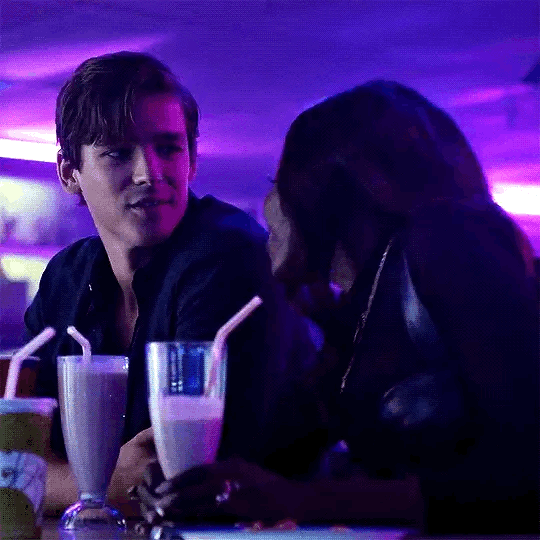
107 notes
·
View notes
Text
I'm not sure if the creators realize, but based on its title alone, Tears of the Kingdom has the potential to turn around the entire Legend of Zelda franchise in terms of its storyline.
Let me explain.
I think we can all agree that in most of the games, there is a core narrative of light versus evil that outlines the game. Link and Zelda are the benevolent heroes of the story and Ganondorf / Ganon is the irredeemable villain. Storywriters for the franchise like to use this formula for the franchise because hey, it's worked so many times, and gained lots of reception, so why not?
But just because it has worked doesn't mean it's right or suitable.
Firstly, given the history of our world, it is problematic that the face of evil for this game series is a dark skinned man from a tribe of women who are based of the caricatures and sexualization of women raised in the MENASA regions (MENASA stands for the Islamic countries in Middle East, North Africa, South Asia) and the face of good is always two white characters who are held in the highest regard. Not to mention, Ganondorf and his foster mothers Koume and Kotake had their character designs in Ocarina of Time based on anti-semetic caricatures. This overall set-up speaks volumes already, but it doesn't stop there. The franchise decided to expand upon the lore of the Gerudo in Ocarina of Time, Wind Waker, and Twilight Princess, explicitly and implicitly establishing that the tribe was, in fact, oppressed, ostracized, and underwent genocide. Some people may argue that this information is up for debate, given that a lot of it comes from Ganondorf who is an unreliable narrator; however, this argument fails to consider that even then, it never proves that Zelda and Link are any more trustworthy. After all, the victors write history. With these complexities added in, it becomes hard to discern who exactly is in the right or wrong. In reality, the matters were never black and white to begin with.
This segues to my next point: the light versus darkness trope is not suitable this time around. It's a very two dimensional, inaccurate representation of the world of Hyrule that conflicts with the goals the creators are trying to achieve in Tears of The Kingdom. If they truly wanted to concentrate on the duality between light and darkness, they've already done it with Breath of the Wild. We had Calamity Ganon, a sub-sentient manifestation of hatred that sought nothing but death and destruction, and it was up to Link and Zelda, who strove for the preservation of life and progress, to seal it. So why continue to expand on that? Why bring back Ganondorf? Personally, I see no point in his return.
Unless… the "Tears" of the Kingdom refer to the Sheikah.
"But, wait!" you ask, "All this talk about the Gerudo and for what? What does the Sheikah have to do with this?"
To explain this we'll have to start at the beginning. No, not Skyward Sword, though it shares striking similarities with Tears of the Kingdom, such as the return of the magatama relics, a character with a likeness to Demise, and the juxtaposition between land and sky. No, we have to go before even then. We have to go to the Era of Hylia.
The Legacy of Hylia
Not much is known about Hylia beyond the fact she was meant to protect the Triforce as supposedly ordained by the Golden Goddesses and the people worshipped her for it. But, notice how we learn this story through Fi, a creation of Hylia, with few additions from Impa, from the Sheikah tribe that Hylia established herself. The Triforce is seen as something to protect in this story they share, though interestingly, the relic itself is designed to be as unbiased and uncaring of the individual that seeks it out. It is, without a doubt, divine (as it quite literally is a means to warp reality), but there is also no tangible morality associated with it.
So why did the Golden Goddesses think it had to be protected? Why is Hylia chosen to do it?
…Why did Demise go for it?
If it wasn't clear enough, Hylia is much more flawed than the creators let on. She feels entitled to the Triforce, though there is no reference but the Golden Goddesses (whom no one has ever witnessed) that says she should. It's selfish, almost childish even, that she gatekeeps it away from any user. It's human. Perhaps her traits are a reflection of the time she had spent with the civilization that worshipped her. Because of this, I consider her to be a demigod rather than god. Not so distant and otherworldly like the Golden Goddesses, but a force of nature that can't be subdued but still respected. Time is ruthless, it flies and it trudges. But I digress. In short, for all that is said about Hylia and her divinity, she was certainly stubborn in her efforts to prevent anyone from wielding the Triforce so that her world could remain the way it is, perfect and idyllic.
But that's the thing, life was not idyllic like she wanted the Sheikah and the rest of the world to remember; no, it was terrible enough to spur Demise and his "demon" forces to seek out the Triforce as a means to wrest control from her. Again, I want to make it clear that Hylia and Demise go beyond the bounds of good and bad. A lot of lives were lost to Demise, to the point the humans nearly went extinct. There's little to redeem on that end. But we're never told the stories from the other side of the battle, so who's to say they hadn't suffered as much extreme casualties? Either way, there had to be something Hylia had done (or even not done) for Demise to take severe measures. The hatred he feels is all consuming, but there is something to be said about how hate does not bloom spontaneously — it is cultivated and grown. Keeping all of this in mind, I sometimes wonder if Demise's name was in relation to Hylia, as in he was her Demise, and that those demon forces of his were actually the demonized. We'll never know. But what we do know, is that the Triforce was the Golden Goddesses' way of giving hope to the mortals, to be able to use divine power to shape the world as they see fit (at least, according to the first Zelda, which is a fantastic moment of irony if you ask me) and Demise had every intention of seeing his future through.
The Sheikah's Story
Now, let's fast forward a few eons and come back to the tears. Many people have associated the tears from the title to be the magatama relics seen with Zelda, Sidon, Riju, Tulin, and Ganondorf. But the tear's symbolism in the franchise has been around for much, much longer, thanks to the existence of the Sheikah. The tear is a part of the eye symbol for the Sheikah, and according to the The Legend of Zelda Encyclopedia, it represents their willingness to go any lengths so as to support their divine mission of protecting the Royal Family that possesses the blood of the goddess Hylia. Given that information alone, wouldn't it make sense that the title "Tears of the Kingdom" refers to the Sheikah?
"Okay sure, but what role would they play in the game?" That's not the point. It's not the role they play now. It's the role they played in the past. Something of particular interest to me when it comes to the Sheikah is how differently the Sheikah are characterized between the games of Skyward Sword, Ocarina of Time, and Breath of the Wild. In Skyward Sword, they were a tribe who patiently for the day to protect the goddess's reincarnation and went so far as to transport her through time repeatedly. In OOT, they were agents who went so far as to secretly carry out the Royal Family's dirty work. In BOTW, they were inventors and sorcerers who went so far as to recreate divine power to protect the land.
But guess what never changes? The fact that they write history.
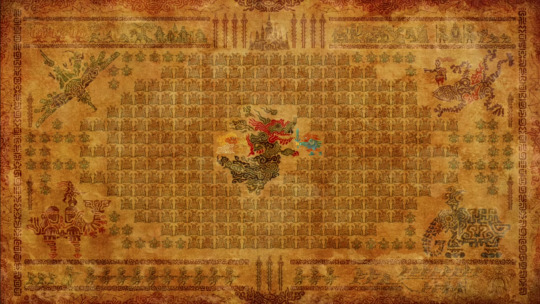
Above everything else, they are the storytellers, and they have seen everything. The good, the bad, and the ugly. But with the role of storytelling, they have the ability to alter it, embellish it. And in the Sheikah's case, they have a tendency to omit the negative, so as to promote support for the goddess and her Royal Family. Think about it: Impa never explains why Demise wanted to take control of the world in Skyward Sword and she's the first to jump to fix issues at the Shadow Temple in Ocarina of Time so no one has to bear witness to what the temple had actually turned into. If she did, Hyrule would surely fall into chaos. To Hyrule, the governing powers like the goddess Hylia and the Royal Family are the pinnacle of morality. That image can't be compromised.
And for a time, it wasn't, until we reach Breath of the Wild. That's when things get interesting.
In the tapestry, as shown above, a majority of it is occupied by the tale of the warrior with the spirit of a hero, a princess with divine power, and a technological army pioneered by Sheikah. That's what the game's creators want you to see. But do you see that little strip at the bottom?

Yeah, that. It's a tiny piece of the story but it's a big one. By now, most game fans know that is the history of how the Yiga Clan came to be. Cado, one of the Sheikah that stands guard in front of Impa's home, elaborates on this imagery, remarking that once upon a time, the Royal Family (more specifically the King of Hyrule) did turn on the tribe that swore nothing but utmost loyalty to them.
Of course, this seems counterintuitive. Why punish the people who protected you? What was their sin? As far as we're told by Cado, Sheikah technology had once been praised as "the power of the Gods". Now, I won't get into too much detail about this, but the Triforce, which you might have noticed isn't really mentioned by word of mouth in Breath of the Wild, is now a power of the Royal Family that is passed down. All parts of it. It's a lot to take in, given my lack of elaboration, but I recommend watching THIS video by Monster Maze who does a fantastic job exploring the nature of the whole Triforce being hosted in an individual body.
But what I want you to take out of this information is how there is, essentially, a rivalry between the Sheikah and the Royal Family, a sudden leveling of the playing field that the latter party does not want. It's eerie how similar they act as their ancestor god. The entitlement is present yet again: you cannot change the world like I can, you cannot be as powerful as I am. I have the final say. This certainly paints a more explicitly, vicious picture of the Royal Family, but it's nothing really new. After all, the Sheikah remember everything cruel that had been done to others by this family, by them, but hid it for the purpose of the "greater good". But once they become the target, everything changes. The Sheikah don't remove it from history. They remember it. Some more passionately than others.
Ties between the Gerudo, the Sheikah, and the Yiga.
Something else on the Sheikah tapestry that seemed out of place for me is the depiction of the hero.
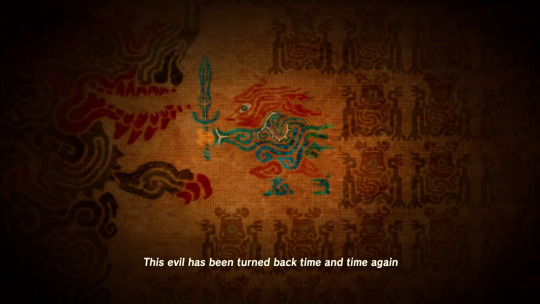
He is clad in green, which one would imagine, is a reference to Link's green motif throughout the games. However, I fully believe that detail is a red herring — that is to say, it's meant to throw us off. And from what I have seen, most fans of the game agree. Why? Because that same individual has red hair and a sword that looks more like a golden claymore than the sword that seals the darkness. And well, given that the Gerudo are the ones who use golden claymores, plus the way the figure is drawn to have a knee bent, there can only be one person this image is referring to:
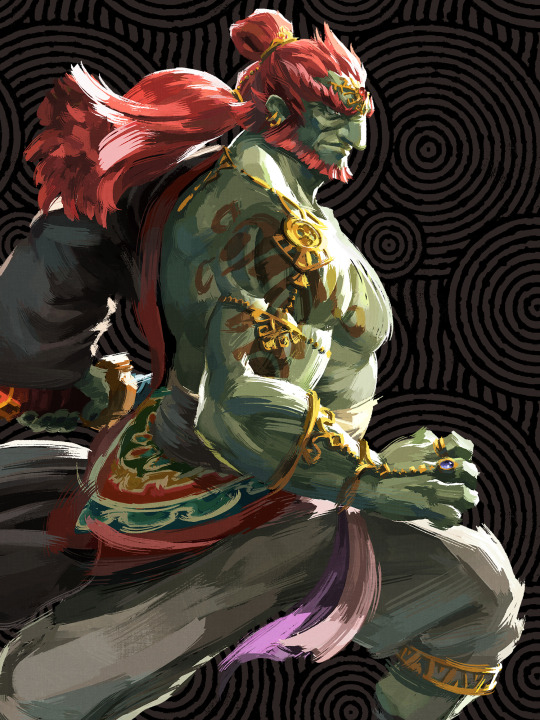
Ganondorf.
Keep in mind how the Sheikah have erased his name, but did not erase him, and that the Yiga swear their allegiance to Calamity Ganon. To be completely honest, I think the Calamity did not have the name Ganon to it 10,100 years prior to the events of Breath of the Wild. But, to explain why it suddenly does in Breath of the Wild, I do believe Ganondorf had a calling to malice, whether the kind left behind by the Calamity or the kind that was already existing throughout the land. Read THIS post by @golvio to get an idea of what I mean. The only change I would make regarding this theory is that the people did not originally see the malice as inherently evil. A little rot was needed to clear the space for new growth. But with great power comes great responsibility, and I think Ganondorf might have utilized the malice in a manner the King of Hyrule was not pleased with.
How so, and why? Well there can be different reasons to choose from for the creators, but I have a personal favorite theory that explains why the Sheikah and Yiga remember Ganondorf more acutely than even the Royal Family and why there's ruins in the Gerudo Desert: As a last resort, to protect the Sheikah who helped him defeat the Calamity, and to reclaim the technology they lost, Ganondorf used the malice to take over the guardians and to get rid of the soldiers wiping out the civilians. In response, Zelda from that time was tasked with defeating him with the help of the other "Sages" (those who possess the magatama relics/tears) and one of those sages sealed him away with the Zonai hand. Zelda's betrayal breeds the hatred that Demise foretold would reincarnate, time and time again, leading to Ganondorf internally accepting that a peaceful world is a world without the Kingdom of Hyrule, without the Royal Family, completing the cycle once more.
And so here it comes, the big storyline change that Nintendo stands on the precipice of:
To break the cycle, Ganondorf is not the one that needs to necessarily be redeemed. It's Zelda. That isn't to say that Ganondorf isn't flawed and should not repent; there are a million things he could have done better or have not done, whatever it is that lead him to be sealed. And what I mean by Zelda having to be redeemed is that even though she technically has done nothing personally to Ganondorf, it is her blood that binds her to the ancestors who spurred the very hatred that fueled the Calamity and left behind a legacy built on the maintained misfortune of others. If anything is to change, she must be the first to cast aside her fear so that the cycle cannot repeat again, and instead work on understanding her family's past and building her faith. And no, I don't mean her faith in the goddess (she has lost too much trying to), but faith in the goodness of a man who was unfairly pushed to become the worst version of himself to protect the helpless.
#i would love a change like this so that the franchise can start steering away from its racist past of “white ppl good poc ppl bad” yknow#the way i see it botw is where the royal family essentially atones for the heinous crimes they committed over eons#sort of karmic in a way#having lost most of its people history and culture just like the gerudo had in twilight princess and wind waker for example#and then botw zelda takes responsibility and lays the blueprint for a more prosperous future that includes EVERYONE to the best of her abil#now how she would convince ganondorf that she's being genuine is beyond me but someone else can take care of the details#and well. ganondorf doesn't HAVE to forgive her he just got out of being dead so#what matters is that zelda tries and no matter the push back she's not going to make the same mistake as her ancestors#loz#tloz#the legend of zelda#legend of zelda#botw#breath of the wild#totk#tears of the kingdom#ganondorf#zelda#impa#hylia#demise
81 notes
·
View notes
Text
Reproduction and Character Masking: An Endless Chain of Sorrow
I’m a lover of authenticity and sovereignty, and in my experience most people are not. I have mentioned before how most individuals are automated organic androids, except they are becoming more and more inorganic, genetically-modified. There may be some silver linings to humanity’s increasing convergence with technology though. They need to build up what they have lost and redevelop intelligence and peace which they have thrown down the gutter after aeons of self abuse. Maybe the Prometheus Project isn’t such a bad idea. If the average person lacks both EQ and IQ, is addicted to conflict, and is a remedial junkie so as to ignore the piling karma, maybe it is best for the elites to retrain this person into the image of a more advanced being. Prometheus after all was the light bearer, guiding the beast out of the darkness of ignorance and into divine wisdom of good and evil, the discernment of which is lost to many in these trying times. The average persons lack of understanding of free will and karma has decayed their minds exponentially, because they cannot visualize the bigger picture, recognise pattern, or understand that there are consequences for every thought and action. They live as though they are completely detached from both body and spirit, such is the result of glorifying patriarch-consciousness and phallic philosophy. The lack of respect shown to the body is magnified every day through the collective consciousness, and if the vessel, a manifestation of spirit in 3D, is damaged, spirit itself may vacate the dense formation known as body to the point where spirit no longer rules it, but rather a set of primal, devolved automated instructions designed simply to perpetuate the Godless vessel sans conscious spirit. The evolved being must understand that the devolved being has been spiritually absent for a long time, which is why character-masking is rampant, they do not even know who they are which is why they adopt a new identity every year or simply stare at a screen to figure out who to copy-paste into next. The more old school approach would be simply termed keeping up appearances, and as we know, what appears to be a certain way, is not always true in reality, as maskers improve their techniques with each passing epoch so as to survive, fearing the natural death that awaits the ego. Ego is not meant to survive for long but it is a smart parasite which ensures that the soul stays dead so as to keep itself going. Reproduction as it exists today is simply a mechanism for competing with God, which is why ego is so fervently obsessed with it. Ego is at constant war with spirit, so copulation must always try to thwart parthenogenesis or anything higher up the Great chain of Being than itself. Because most people have banished their own souls to the underworld while welcoming hell-demons to possess their vessel, they naturally do not care about why higher concepts are hidden from public view, the real truth is that everything is hidden in plain sight, which ultimately means there is no hiding to begin with and all things are visible to those who actually wish to see… and if you don’t, well good luck decaying and rotting in a hell of ignorance, lest you be reborn through the fire. Those who are obsessed with masking/keeping up appearances are also obsessed with physical reproduction via coitus through the Hermetic principle of gender, and usually their reasons for engaging with both are the same; continuity of an automated reality, why you may ask, who knows, not even them, as there is no end goal. Just keep going. They view both the self and the other as a machine to extract token niceties or bodies to keep the beast-system going. The world is predator-prey because the vast majority is soulless, thus ruled by duality. Creativity for the average person begins and ends at physical reproduction which is why they emphasise it, and because they have no creativity derived from mentalism, they reproduce ideas derived from others and recirculate these ideas and mannerism in a continuous cycle under the guise of politeness.
#reproduction#masking#social cues#automated reality#3D#holographic matrix#higher senses#higher self vs lower self#spirituality#hermetic duality#ascension#social analysis
14 notes
·
View notes
Text
Batjokes in Batman: Last Knight on Earth
I'd highly recommend reading LKOE before reading this meta, but I'll quickly summarize utc (spoilers, obviously).
Basically, Lex Luthor challenged Superman to a debate for evil versus good. Luthor won, Superman died, and the population picked off most of the superheroes. The remaining superheroes had a final meeting to try and decide what to do. The public was outside the hall. Batman opened the doors and let them in. They massacred everyone. Batman survived but barely and when he recovered his mentality was broken. He returned as Omega to try and save the population by acting as a dictator, essentially. The story follows Joker (who stayed alive as a severed head, somehow) and a Bruce Wayne created by Bruce's perpetual Batman machine, on their quest to stop Omega and save the world from being mind-controlled.
So, an idea that I've heard quite a bit is that Joker loves Batman, not Bruce. I've always been of the mind that it's more complicated than that.
A major theme in Batjokes is the idea of duality, Batman and Joker as opposing forces who complement each other. "You complete me." There are different interpretations of this idea, both from creators and fans. In The Dark Knight, Joker loves Batman because in Joker's own words, he's "too fun to kill". Joker is fascinated by Batman, and his interactions with Batman satiate his sensation seeking/need for stimulation.
Scott Snyder frames it as more of an ideological battle: "... the romance between them for me has always been this sense of them locked in this dance. 'We love each other. We can never leave each other. I am the other half of you. You complete me.'"
And then there's the aspect mentioned in Endgame: "fighting for meaninglessness but giving meaning by virtue of the fight." Engaging in this ideological battle with Batman gives Joker a reason to continue existing; it gives him a purpose in a reality he perceives as cruel and absurd and ultimately futile.

There are different aspects of this and different viewpoints and they're all valid. But I interpret the whole "you complete me" thing in somewhat of a different way.
To me, it's more like: I love you because in another world, our roles our swapped. I love you because you care about everything and everyone so deeply even though it doesn't matter in the end and you know that. I love you because you experienced the same kind of world-shattering trauma that I did, but rather than giving in to the futility of everything and embracing the chaos of the universe, you chose to fight back. I love you because you choose to try and save everyone even when logic says it's impossible, because you keep getting back up even when you know you're just going to get knocked right back down again. I love you because the world told you "life is meaningless" and instead of accepting and internalizing that, you said "then I'II create my own meaning". I love you because you are everything that I'm not.
I've always believed that Joker loves Batman for his humanity, for his hope and faith in his fellow people and his desire to help, his striving to make things better and to save people even if it doesn't ultimately change anything in a major way. But as I said before, it's complicated. I think that Joker is simultaneously frustrated by Batman continually trying to save everyone, in part because it's pointless to him, but also in part because of how it reflects on him and his worldviews. He hates the possibility that his way of dealing with the meaningless of everything is wrong. His nihilism is a survival strategy and not something he can easily let go of. Hope, optimism, and belief in the goodness of people are not luxuries that he can afford.
In a very real way, Batman embodies what's left of Joker's hope. Batman represents the possibility that people can go through the worst the world has to offer and still retain their compassion and belief in other people and desire to make things better. I think that's one of the reasons Joker pushes Batman like he does, and also one of the reasons Joker wants Batman to break his no killing rule on Joker specifically and not someone else; he doesn't want to be alive in a world where Batman is no longer a source of hope. I also don't think that he can admit this to himself, if he's even consciously aware of it.
Joker's conflict with Batman is his way of clinging on to hope. Hope that maybe, just maybe he's wrong. Maybe kindness and compassion and trying to help isn't futile. Maybe not everyone is bad, maybe people are deserving of help and the faith that Batman puts in them.
Joker is so traumatized that he genuinely cannot allow himself to have that kind of hope again. It's a common thing with complex trauma to have negative core beliefs about the world and humanity in general. Joker's nihilism is a coping mechanism. He cannot allow himself to be anything other than nihilistic, he can't afford the luxury of hope because if he dared to hope and it backfired it would break him (or that's his perception, at least). This is kind of echoed in TKJ, although you could argue that's more about trust. I think it's both.
I think that Joker loves the part of Batman who wants to save everyone, who puts on the cowl with the intention of not letting anyone else go through what he experienced as a child, who has compassion for even the worst of his rogues, just as much as he loves the part of Batman who is violent and pathological and wants revenge for what he went through. And he wants Batman to get the joke, i.e., accept that everything is meaningless and stop trying to fix things when it's ultimately futile, and stop trying to help people when they're fundamentally bad. But he also wants Batman to keep pushing back, to keep trying to prove him wrong.
Unfortunately, there isn't much evidence for this in comics (largely because not a lot of creators dare to tackle what's going on in Joker's mind and instead just use him as a chaos edgelord villain). The closest thing is this excerpt from TDKR:

You could make an argument that Batman keeping count isn't an expression of him caring about the victims, but l've personally always interpreted this quote as meaning "I love you because these people's lives mean nothing to me, but you care about every single one I take."
Asiide from TDKR, LKOE is one of the only comics that actually has some evidence for this idea.
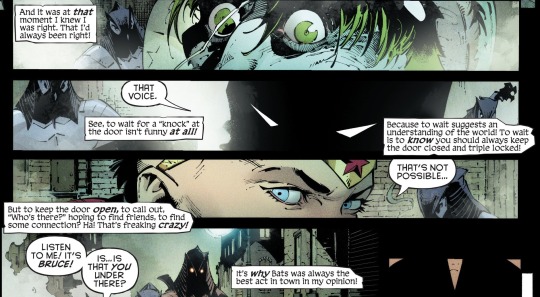
This is obviously a reference to Bruce holding the door open for the mob of people. But you could also interpret this as a metaphor for a lot of things. Really any of those concepts I mentioned that Batman represents/embodies and that Joker denies himself, like hope, optimism, belief in the goodness of people, etc. So what he says next, "It's why Bats was always the best act in town in my opinion!"
You could also interpret this in a few ways. One is that he's saying that Batman was the best act in town because he was crazy, and Joker derived entertainment from that. But you could also interpret it more as Joker loves Batman because he would hold the door open, because he believes in people and he because he tries to save people, tries to help even if its dangerous or ultimately doomed.
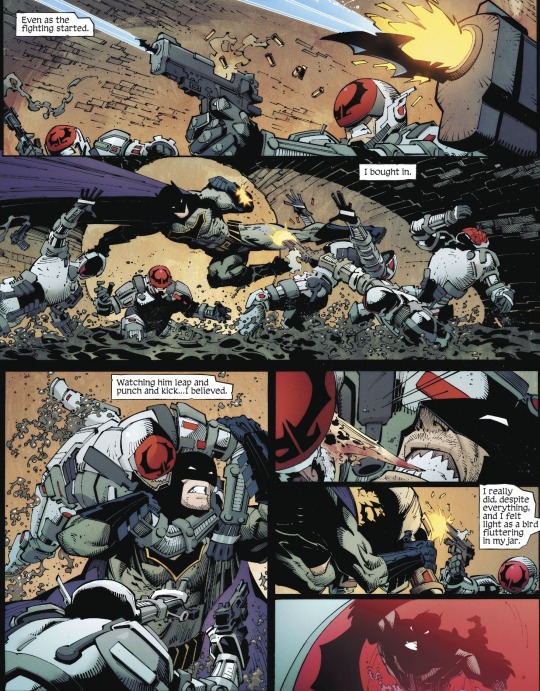
Here we have Joker finally allowing himself the luxury of hope. He allows himself to believe in Batman's cause. And just prior to this, Joker took Tim's old Robin robot suit, which is significant of in itself. Obviously it varies with the person behind the mask, but the actual role of Robin represents the lighter side of Batman's crusade. Hope for the future, childlike optimism, belief in people and belief that things could be better, that people's actions do have the capacity to make things better. Batman needs a Robin to avoid getting sucked into a pit of anger and vengeance and despair. Aside from the human connection, needs someone to remind him of the lighter side of things.


So obviously having Joker take up this role when he usually represents pure nihilism and chaos, the idea that life is meaningless and people's actions and efforts to change things don't matter in the long run... It's a role reversal that shows how Joker and Batman's dynamic has been forced to change in this post-apocalyptic world. Earlier, Bruce says that Joker can't be Robin because Robin "was just a good person trying to help." Whether Joker fits that description is debatable, but he certainly has changed.
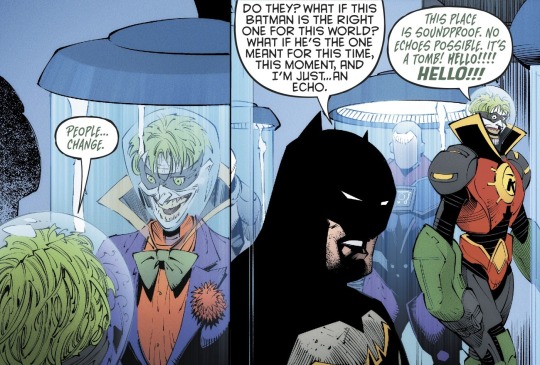
Joker's character development is further emphasized in this page, staring at his old costume, what he used to represent and fight for with his reflection showing where he is now. You could also argue that the next panel with Joker talking about the echoes is him trying to comfort Batman in his own way; that's more debatable but it would fit in nicely with the idea of him filling the role of Robin.

"All I've ever do is tried to challenge you, make you stronger. If you ever broke, you weren't worth it. But this time... this was it... you'd fall if you didn't see." For all the times Joker has said that he wants Batman to be in on the joke, for him to see that everything is meaningless and that what he's doing as Batman is insane and won't help anything because people are not good and don't matter anyway…. Well, imo this quote shows that it's not the entire truth.
The key here, I think, is in the quote "if you ever broke, you weren't worth it." Joker wants to push Batman to the point of breaking, but he doesn't actually want him to break. He wants to challenge Batman and his worldview, but if he ever actually changed his worldview to match Joker's, if he actually stopped trying to change things for the better and gave in to the idea that everything is meaningless, then he wouldn't be worth it.
He's constantly pushing Batman to try to get him and break, to see the joke and stop trying, but also if Batman stopped trying, if he stopped being a source of hope and stubborn determination in the face of a meaningless universe, Joker wouldn't have the same interest in him.
As stated in the I Am A Gun arc, without Bruce Wayne, Batman is just hollow anger. His hope and compassion and desire to help are what differentiate him from all the other dark angry edgelord vigilantes out there. Bruce Wayne is the soft, tender, hopeful human part of Batman.
Joker does love Bruce Wayne, or at least parts of him. He just either isn't necessarily aware of it, or can't bring himself to admit it under normal circumstances.

The circumstances in LKOE are anything but normal, though. Usually Joker wouldn't be able to admit this, that he values Batman's belief people and his has hope and faith and compassion and softness. But things have changed.

Omega is a Batman who has broken. He's lost his faith in people. He's lost his hope. The only way he can imagine a world that isn't violent and awful is by mind controlling the populous. He doesn't believe that people could be good enough to make the world good. He's become a dictator rather than a source of hope.
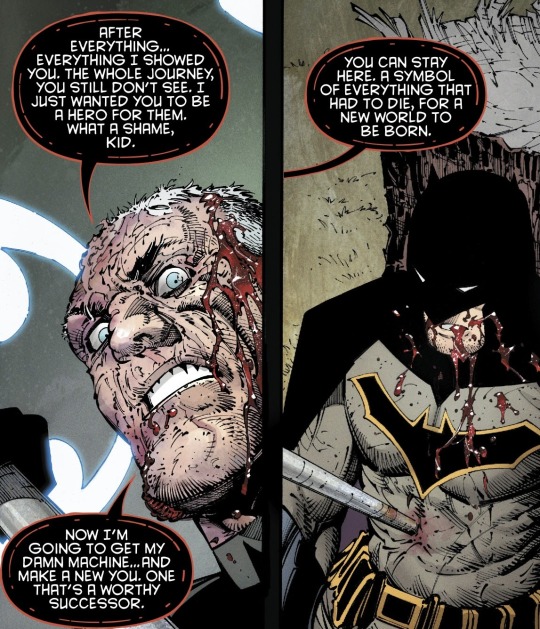
Omega has given up on the world, and he's trying to create a new, better one. But the thing is, Batman would never give up on the world as it is. He would try to save it regardless of whether his quest to save it is doomed, and regardless of whether it even wants saving.


I think this really encapsulates what Joker both loves and hates most about Batman. In a world that says "I have no place for your optimism, there is no room for your point of view and your futile attempts to save everyone in this meaningless, doomed world", Batman says "I'll make my own place. I'll try to save everyone regardless of whether it's doomed to fail and regardless of whether it's ultimately meaningless or futile. I'll make my own place and my own meaning."



Joker's Batman would hold open the door. Because Batman believes in people, has faith in them and their goodness. And Joker knows this, and he loves and hates it.
Ultimately, Joker is the one who helps talk Bruce into not giving up in his fight against Omega. He's usually advocating for the futility of trying to fight for good or trying to change anything, so this is clearly an inversion of that.
As for Joker's apparent hatred of Bruce Wayne; I could make a whole additional meta about this but basically I think it boils down to jealousy and fear of being abandoned by Batman. He hates that Batman is spending time with and energy on people other than him and he's afraid of becoming insignificant compared to the Batfam, essentially. He sees Batman growing as a person in the sense of him making connections, and he feels like he's being left behind because Batman is changing but he isn't. And then there's the jealousy; Batman has connections and people who care about him but Joker has no one.
While LKOE isn't canon, I would argue that Snyder's characterization of him and his motives is consistent enough to generalize across all of his work. So with LKOE in mind and the idea of Joker loving Batman's hope and compassion but not being able to admit it, and him framing it as an ideological battle as a way to rationalize it so he doesn't have to admit to himself that he loves Batman for the softer parts of him (in addition to his darker qualities ofc). There are some examples that hint at this, too.


Here we have Joker admitting he doesn't want either of them to win. To me, this has always read like Joker wants to believe in Batman's message, he wants to believe that things are meaningful and that people can be good but he can't, and this eternal fight is his way of preserving a shred of hope and creating meaning for himself. He doesn't actually want to win, he wants to push Batman and see him continue believing and being a source of hope and trying to change things even though Joker is trying to break him and his worldview. It's almost like every time Joker challenges Batman's worldview and he doesn't break, it gives Joker just the tiniest little additional bit of hope.
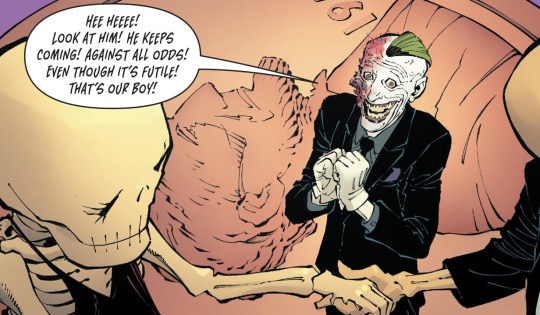
And then we have this. It's not as direct as LKOE, but I think the sentiment of Joker loving Batman for his caring and trying to change things and making his own meaning in the face of a meaningless universe is very much present in this panel. I suppose you could read this as sarcastic or trying to make fun of him, but I still think there's at least a shred of truth to it.
So, while LKOE isn't canon, I still consider all of this to be accurate to Joker's character in general, including in canon continuity. Although you're more than welcome to disagree with me.
60 notes
·
View notes
Text
Heading Down the Wrong Path
One of the big themes of Zuko’s arc in ATLA is the struggle to not be his father. That ultimately while he has the capacity to do great good, by that same very token he has the capacity to do evil. It’s that duality and inner conflict that followed him right up to the very end of the series.
So naturally, said struggle should’ve continued in the comics. Zuko is now in the same position his father was in. And so would come new challenges and that same dilemma now that he is leading a nation.
At least…that’s how it should have gone.
To understand the failure of Zuko’s comic arc, we need to understand Ozai himself, his philosophy, and how he came to power. After all, the narrative makes it clear that Ozai may be what Zuko could become if he doesnt course correct. In many ways, Ozai embodied the absolute worst the nation had to offer, whether it be its colonial superiority, or unrepentant warmongering. Being an unrepentant warmongerer whose first and only response to any challenge, whether from within or without the Fire Nation, was violence. We saw that when he literally burned half of Zuko’s face off for disobedience, even claiming that “suffering will be his teacher”. Even when faced against the Avatar, he claims that he has all the power in the world and takes a bit too much pleasure in tearing down a literal child.
Ozai also has a very nasty sense of entitlement. He genuinely believed that he was destined bring a literal end to the world and reign over its ashes as the Phoenix King. He wouldn't share his glory with anyone (abandoning Azula to her fate at the day of the Comet) because he's the leader of the greatest nation on earth in his eyes, and so should be practically worshipped as some kind of god incarnate. And mind you, he was willing to step on anyone and everyone in order to secure his power. That's how important being the Fire Lord or the Phoenix King was to him.
His rise to power also involves screwing over his entire family. Stabbing Iroh in the back on the worst day of his life, exiling Ursa, and conditioning both Zuko and Azula into exactly what his vision entails, regardless of their own thoughts and wants. And when they don't measure up, he tosses them away without a second thought. Essentially, his needs come first. Everyone else is secondary or a means to an end.
Warmongering. Entitlement. Selfishness. Those are the pillars of what made Ozai into what he is. Regardless of how he was treated by Azulon, he turned out into a tyrant that almost destroyed the whole world in the process.
And it's a path that Comics!Zuko has been forced on by the writers.
Let's do a bit of a recap: Ozai believed in the superiority of the Fire Nation and all others were subservient. In The Promise, Comics!Zuko tries to make the asinine observation that the colonies in the Earth Kingdom actually improved things...when in reality the ones who are benefiting from the bolstered economy are the Fire Nation citizens in charge. Mind you he should've known better by now due to his experiences in the Earth Kingdom.
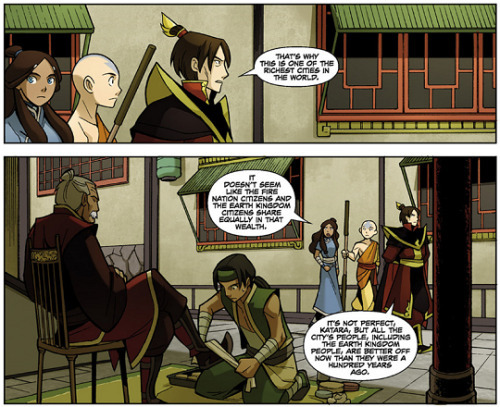
And when King Kuei objects to the Fire Nation refusing to let go of its colonies, Zuko literally dons a helmet that eerily looks similar to his father and almost restarts the whole damn war.
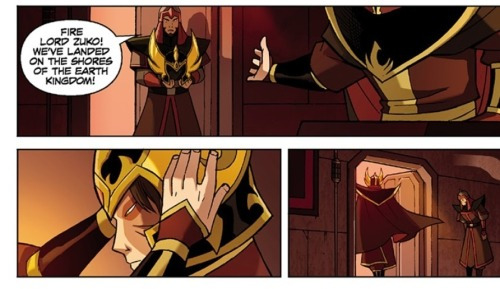
Now to Yang's credit, this is part of the point of The Promise. That Zuko is turning into Ozai is addressed and is supposed to have learned. I get that.
Problem is at the literal end of Yang's run, we get this scene.

Shows up in literal war balloons to address a conflict in the Southern Water Tribe...you know, the people who were raided and probably wouldn't appreciate him showing up in such an asinine fashion. Something he did at the very beginning of the series and was acknowledged as a bad thing.
And the guy who obviously doesn't want Zuko there since a scene like this would've been terrifying for his people?
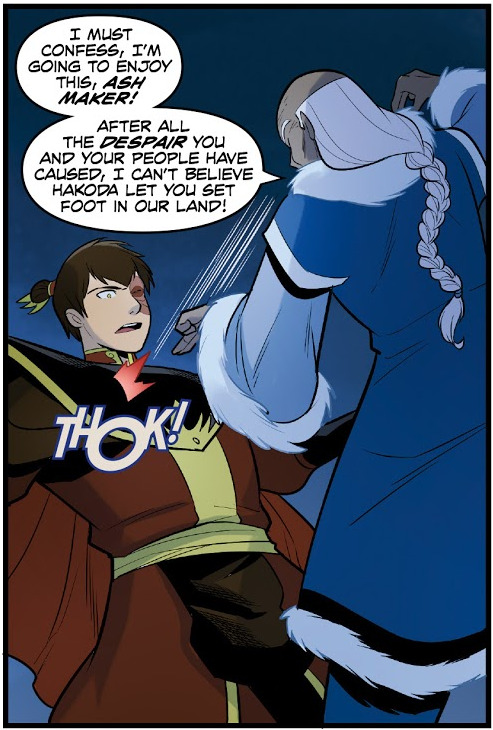
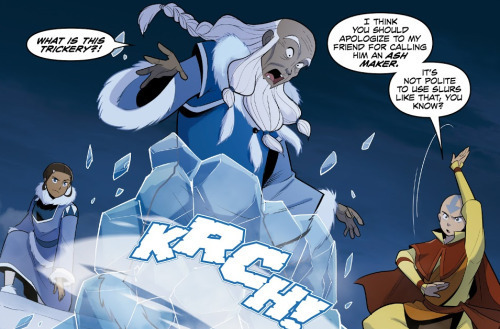
Yep. They try to pull the racism card and claim that Zuko was somehow in the right this time. I'm sorry, but you can't exactly claim one thing then do a complete 180 the moment your aesop becomes inconvenient for you.
So Zuko has clearly forgotten the whole "warmongering is bad" lesson he learned in the series proper.
Neither has his entitlement to the crown gotten any better. Admittedly, he gets nowhere near the levels of the Phoenix King, but the egotism and belief that the throne is his by all rights are warning signs.

Mind you, he was still under the assumption that he was a bastard son of Ikem...and yet he still believes the throne is his destiny.
The same thing happens again when in what is supposed to be a badass moment, it flounders when he has this smug ass look on his face while declaring the throne is his.
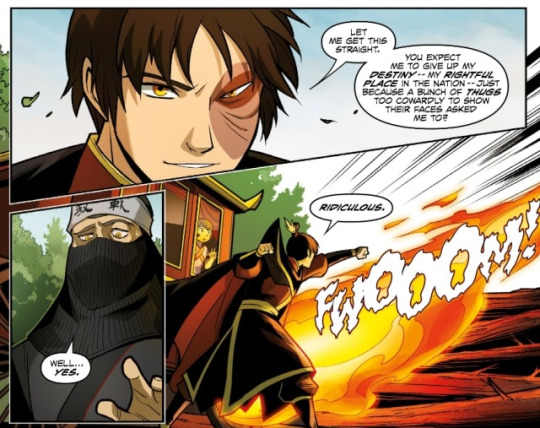
While he did have this longing for the throne in the series, I don't recall it ever being this bad. And he certainly wasn't smug about the whole thing either.
Finally, there's how he treats his family and loved ones. The only ones who are regarded by him as "good" are those who shower him with utmost praise and respect like Ursa and Kiyi. Those who don't and push his buttons?

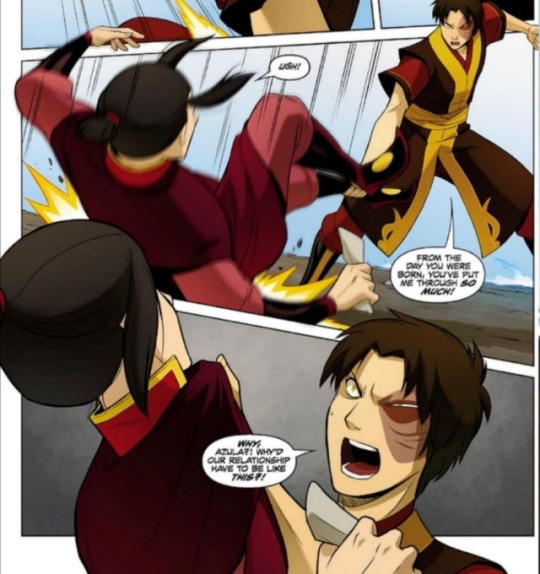
Either tries to pull rank and orders them to obey him, or literally physically assault them. And let's not forget the time Zuko literally locked Azula in with her abuser just to get information out of Ozai. AKA: the same thing Ozai did to her.

To make things perfectly clear...I am not saying Zuko is now Ozai 2.0. What I am saying is that he display multiple warning signs of going down that path, inadvertently, and the narrative never calls him out on it. He's supposed to be the good guy. The villain turned good. He's supposed to be on the path to righteousness. But time and again, he shows signs he's going back to his old ways. And nobody calls him out on it.
Am I saying Zuko can't relapse into his old ways when ascending to the throne? No. I'm not. He's a teen and admittedly wasn't the best prepared by series end. Not to mention his problems won't just go away now that he's Fire Lord. I can accept that. And to be fair, he does acknowledge his faults by the end of Smoke and Shadow and declares to do better.
But being this late in the game...he has not improved. As much as I harp on his arc from the series, I will admit he was trying and making progress. Here? He doesn't. He just says words but doesn't do anything to back them up. Especially when he continues to cause problems in North And South and the narrative continues to support him despite him not changing.
In short, Zuko should've backed up his words, like he did in the series. Here? He never did. Which is an utter betrayal of his entire story arc from the cartoon.
Zuko should've seen the man who gave him a scar on his face and say "No, I'll never be like him." He should never validate any of his teachings or beliefs. That is what he should've done and learned. That is what the comics did.
But they didn't. And now Zuko is on the path to becoming like his father.
#zuko#fire lord zuko#zuko meta#ozai#fire lord ozai#anti atla comics#atla comics critical#atla meta#bad writing#character regression#zuko deserved better#feel free to disagree
92 notes
·
View notes
Text
People claimed Aspros is merely cheap copy of Saga.
nah, they are different fundamentally, despite some elements . Degel also have events that mirror Hyoga but no one says he^s hyoga copy( even in writing) how I respect fate fandom for never mistaking nero claudius for altria pendragon, coomers they are. the amount aspros got mistaken for saga? disgusting.
Saga defines himself as a public/athena's servant, and his mental issues from his insecurity of his inability to kill his emotions to be a dutiful knight and NOT be his own person,.as if for him, to be himself is a sin, and we know it is imposible to un-person yourself, so he breaks. And he didn't learn better from that, considering what we see in both episode g and saintia sho.
Aspros defines himself as " big brother" , that is, both the good and the bad of being firstborn coded, at first, he was the knightly kind of big brother, think of ichigo kurosaki's quote " big brothers born first to protect the younger ones who born later" which is what base Aspros live for, he lived to protect Defteros. He already has his doubts before Youma corrupted him, that is, once Defteros grow stronger, he ask himself , " if Defteros become stronger, that he can protect himself, will I still be needed? what would become of my identity? " Then after Youma corrupted him he become the negative kind of big brother, that is, the entitled/ bully one, who thinks " i am born first so it's natural if I own you/ stronger than you" .but point is, no matter how Youma tried to corrupt him, from "good" to "evil", Aspros will continue to identify himself as the "big brother". Youma couldn't take out the firstborn identity from Aspros, led him to think he's only child coded, nope, he is firstborn coded first before anything else, even before he' the Gemini Saint, before he's human even.
Even if he's not corrupted , Aspros will want power not for the heck of it, but as means to protect Defteros, that he even spelled it " I will be strong for both of us so no one can mistreat you ever again" .
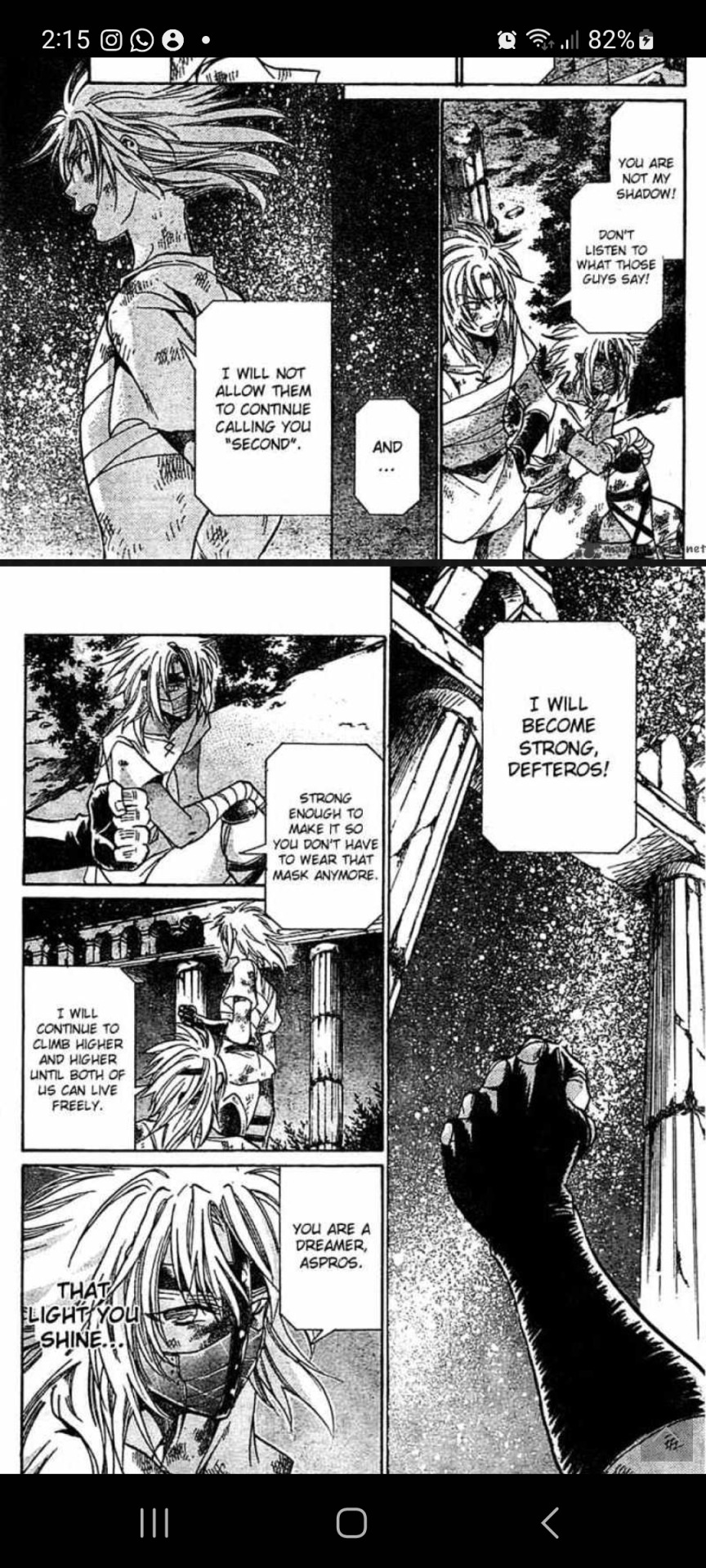
Defteros may not be some kind of little sister younger than 17 and smaller than 160 cm,( he's 27 yo who is 190 cm instead) but it doesn't change the idea he has vibe similar to those little girls, that is, adored big brother, and with cunning big brothers who is willing to get their hands dirty, or even destroy the ugly world so little sister can stay " pure" in a gilded cage, isolated from the ugliness of the world. ( think lelouch or ayato) . while Shun is " damsel little sibling" , Defteros is " ISOLATED damsel little sibling " ( think rapunzel). Think Akio Ohtori or Kaname Kuran. Aspros is THOSE kind of big brothers, yes, THAT implication included.
Sure, later he learned power is not what he, or Defteros wanted, Defteros reminded him what they truly wanted, isolated from the world, away from prejudiced people.
Just like Aspros strongly identify himself as the firstborn, Defteros also strongly identify himself as the secondborn, even after Aspros's death.
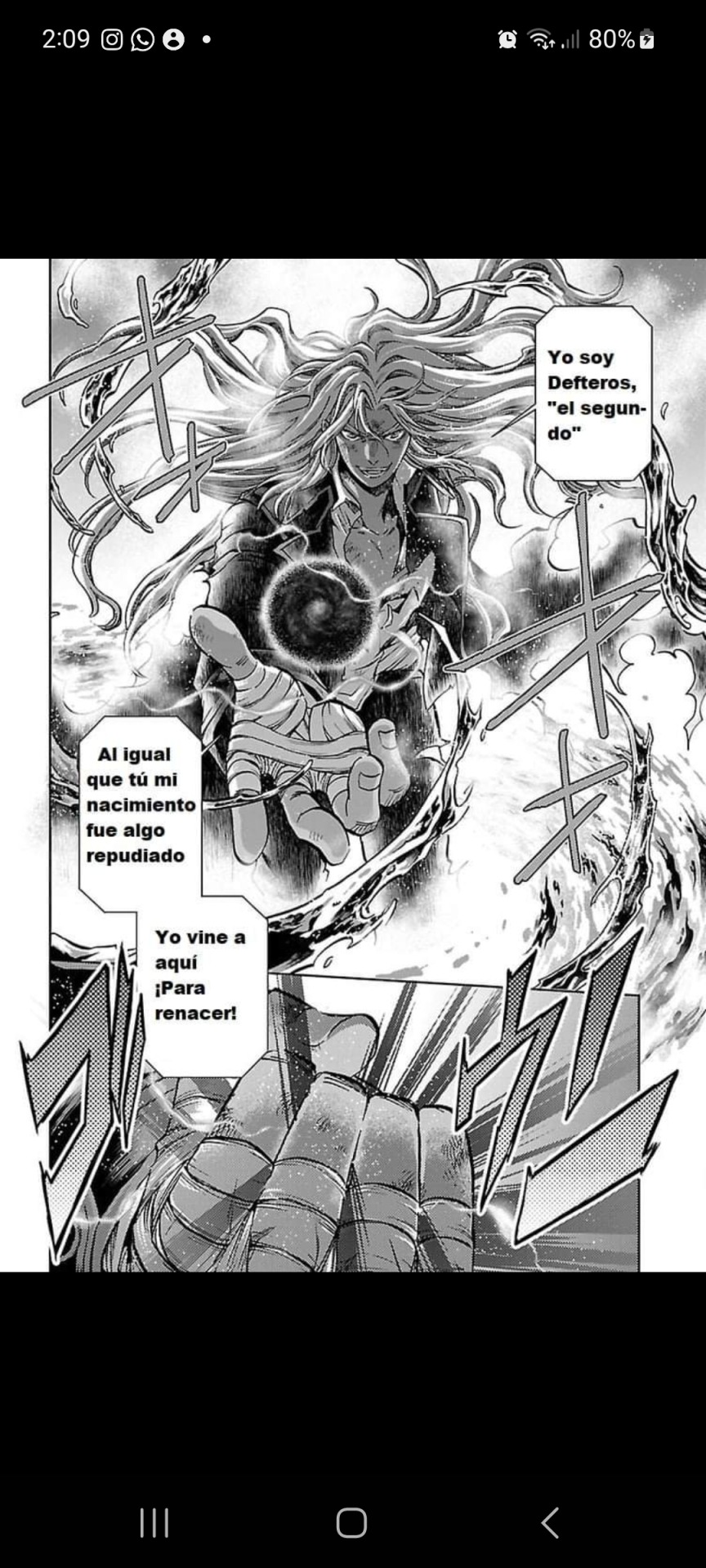
To be fair, he strongly believed they will be reunited so he prepare everything for Aspros's return, ( ironically of all people he parallels Hypnos here, but that's another discussion for later) Lost in translation, but Defteros only refer to the corrupted Aspros by name, he consistently talked about the original Aspros whom he loved and loved him back by brother, not by name. It also goes both ways with Aspros, once he got corrupted, he refer to Defteros by name, not calling him brother.
If he want to, Defteros could've claimed the Gemini seat proper, let him be known for it. If he want to. The thing is, he does not want to, continue to identify himself as the second, continue to pretend as the demon of kanon island, not letting people know he's the gemini saint, even developing memory erasing skill because he wanted to return the Gemini seat/cloth to Aspros.
Kanon is an afterthought, as Kurumada meant to display the duality of gemini with Saga alone, with his split personality, when Aspros is written with Defteros as complementing contrast. Academical intelligence and emotional intelligence. The beautiful snow white' evil queen who did not get what she wants and the dirty cinderella who got the respect she deserved at the end, despite the initial short time to be princess . the metaphorical rose thorns who is looking for the best soil to support it and the literal lava who cools down into fertile soil for the rose to grow on, knight who have seen the world vs isolated damsel, the explicitly sexy shirtless defteros and aspros's sensual, lowkey effeminate body language, etc..
To further emphasize the way they are mutually influenced by each other, they both met another set of siblings in their gaidens. Power hungry Ursula who killed her own father, and the brainwashed but once loving Kokkalo are both parallels to Aspros, when the timid, yet surprisingly powerful Chris, who refused the call, rejecting everything she could get had she accepted her role as the Cetus Specter-immortality, power of both combat and social influence, that all she wanted is to get along with Ursula, to forgive her and loved her always, and the insanely devoted Ema, who would throw away his own life for Kokkalo, yearning for the Kokkalo in his memory, is another parallel to Defteros. The way Chris says she wants nothing but to mend her relationship with Ursula? Aspros know Defteros have the same sentiment. And in his eyes, Defteros is as small , frail and timid as Chris. In turn, Defteros always know Ema's insane devotion is what himself would've done , but like Ema, Defteros knows better it's not the real Aspros, that there is another force that controlled his brother that he could destory, to save his big brother from. The parallels are to let them say what they would say to each other with all the projection, without actually saying it to the real person.
Saga and Kanon both mind their own business, when aspros and defteros actively stalks each other,


manipulates others in order to reach each other (other than entirety of defteros gaiden happens because of Aspros, remember that Defteros did this to Dohko in mainline LC)
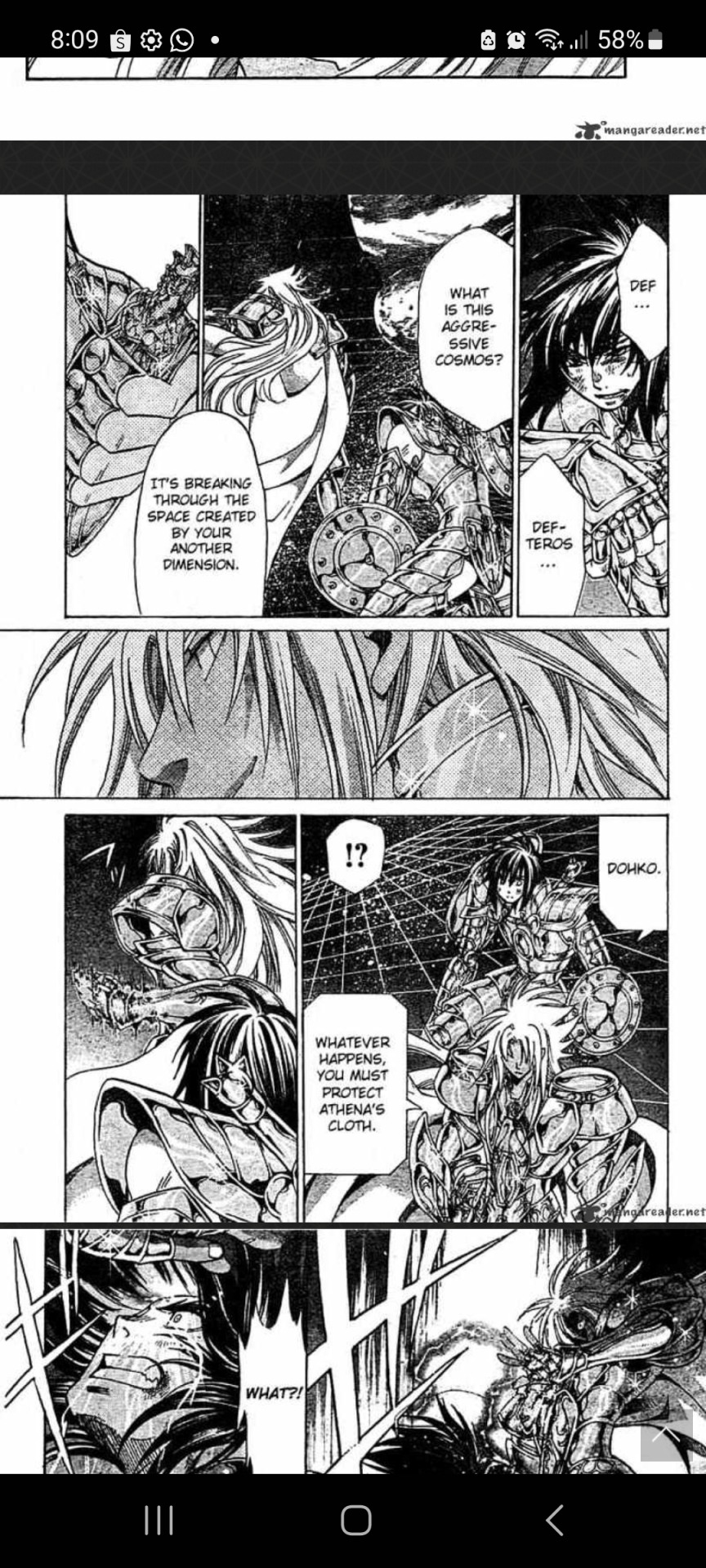

and are defined by each other, molded, defined, and motivated by each other, and they are happy by that, to stick with each other, that ant the end, they are together and that's what they wanted. Saga and Kanon both wanted to change the world and that's exactly why they don't get it, Aspros/Defteros only want each other and that's why they get it, even if after they're both dead.
Aspros/Defteros are the Gemini twins with the most blatant physical differences, not only there's the skin tone, but also, Defteros is larger (190 cm/90kg when Aspros is 188 cm/83 kg)
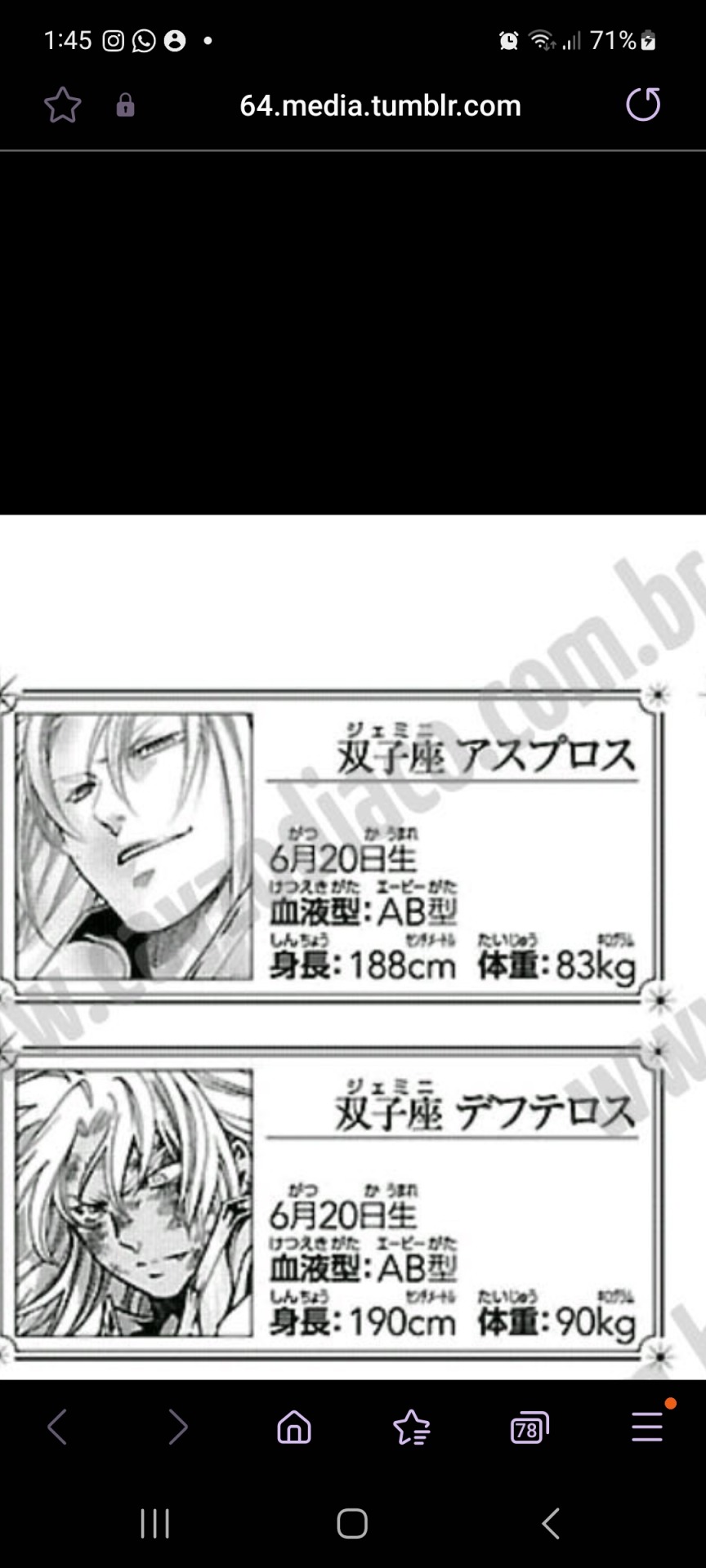
yet, they are the one who keep saying they are each other's mirror images, other halves of one full being. Aspros did think so at first, saying they are one,

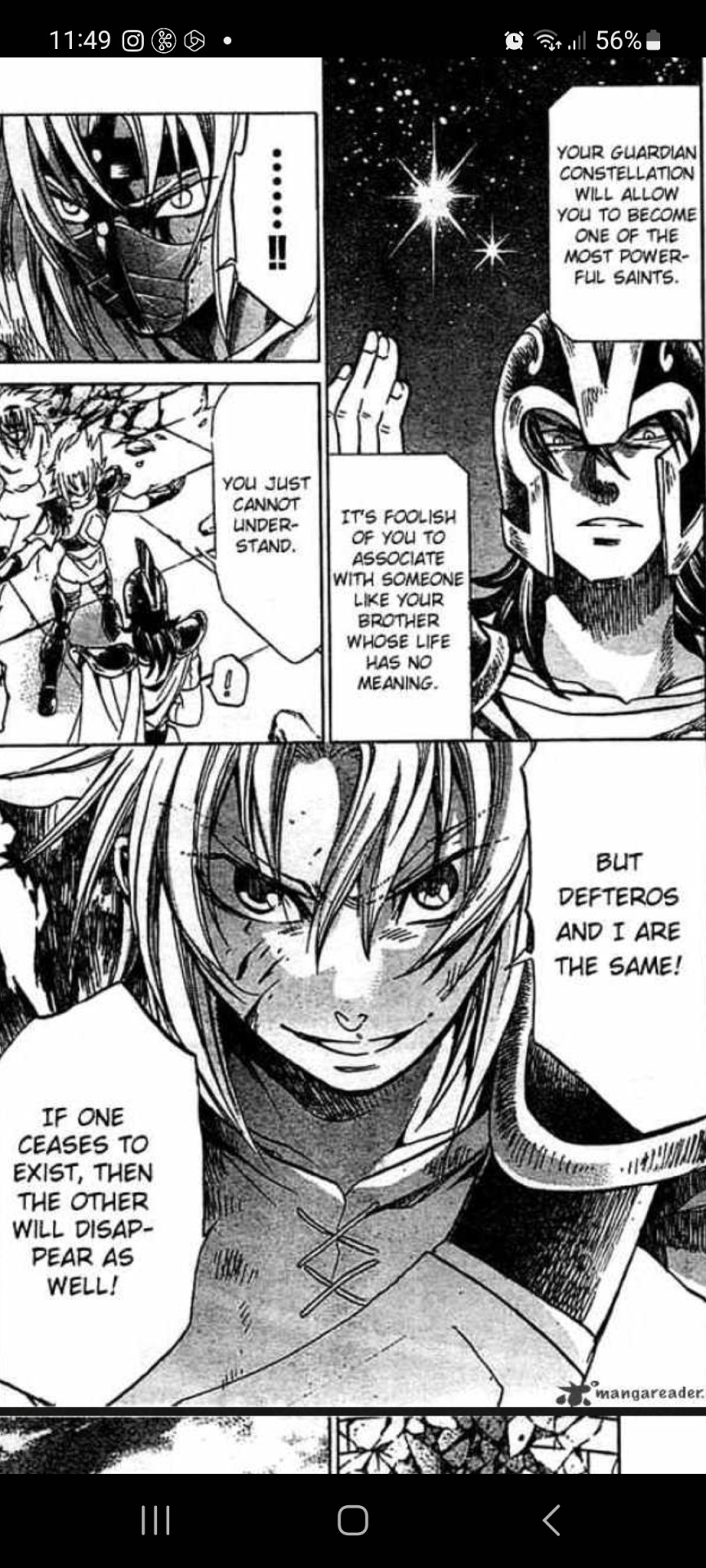
but then after being corrupted, his mind was thinking he's the "original" when Defteros is his "replica", two separate beings, made separately, when Defteros thinks they're two halves of one entity instead. Clearly, the narrative shows Defteros is the one proved right with that. Aspros literally means white. And Defteros' technique literally is BLACK eruption. I was thinking of Pokemon Black White here, but inverted. Aspros is the ideal that with enough hard work, they can finally be together undisturbed, Defteros is the bitter truth that only beyond the grave they can be together.
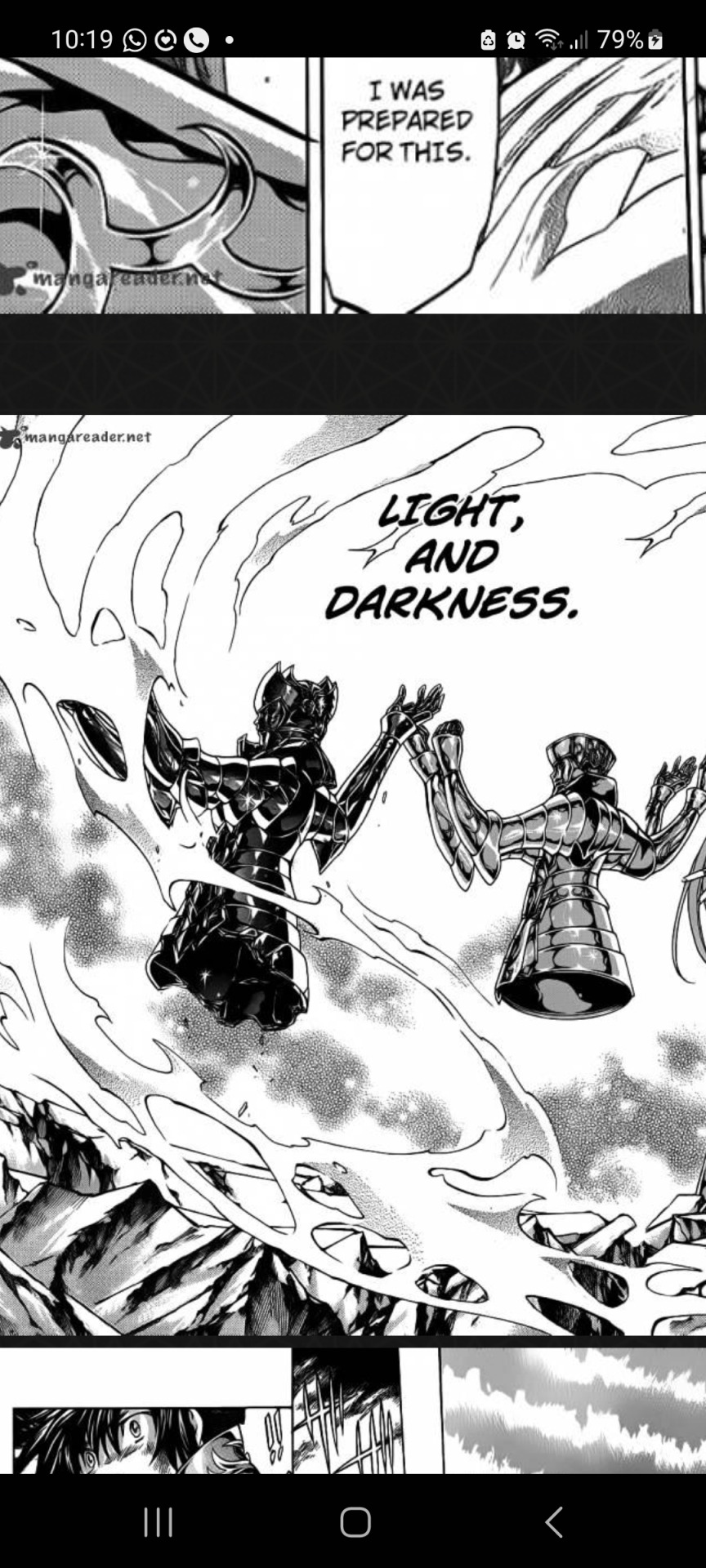
When zodiacs is compared/ connected with tarot, Gemini corresponds with The Lovers. Aspros/ Defteros are written with this fact in mind, that they display both upright and reversed meaning of the card. The upright meaning is mutual love, harmony, correct choices, trials overcomed, values aligned, soulmates/unions, deep trust. reversed meanings is disharmony, misaligned values, bad choices resulted from recklessness and indecisiveness alike, conflict, detachment, distrust,
At first, they truly care about each other, trusting each other, with mutual goal of overcoming the idea of gemini cannot be together. Then Aspros is corrupted and changed his values, his views, and growing more detached . Defteros knows something is wrong , he keeps distrusting Aspros even if lowkey. As Asmita puts it, things happened not only because Aspros is too impatient and reckless , but also because Defteros is too indecisive to stop him. After Asmita's calls out, Defteros realizes that he is Aspros' demsel no longer and it's time for him to act, that is, to be the one who saved Aspros after Aspros saved him in the years before. he's literally that "i can fix him " character stereotype towards Aspros. Except he actually succeed. Then after their fight they literally become one, and Aspros gloating they really are soulmates.
Look at these images to see how suggestive they are/how bad they desire each other. ( in case it's not clear, Aspros is stepping on Defteros's head here, effectively pegging him, as you can see Awakening repeat the scene without the sitting part but you get it )


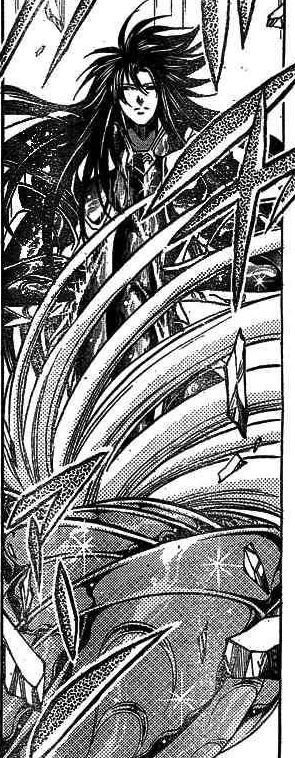


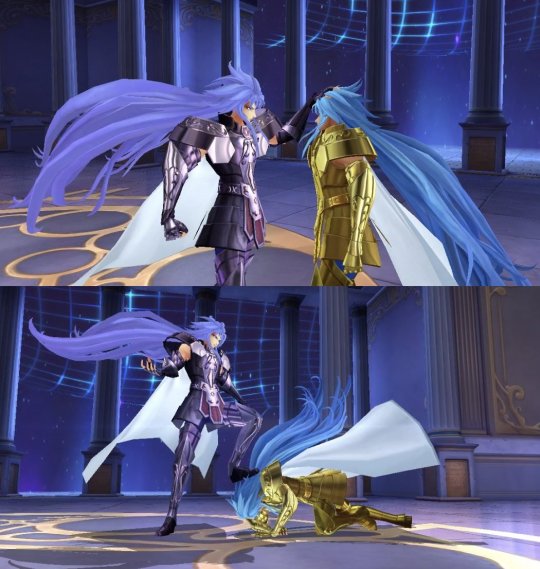
tldr: Saga would die for the world itself. Aspros , even in his best day, would destroy the world so that people can not shittalk defteros anymore. alternatively, you can talk about saga without kanon but you can't talk about aspros without defteros
here's some more if u wanna read more about aspros defteros https://at.tumblr.com/draceempressa/we-know-in-universe-aspros-treat-defteros-as-if/arj2fjdghkwn
also you when reading this essay probably:
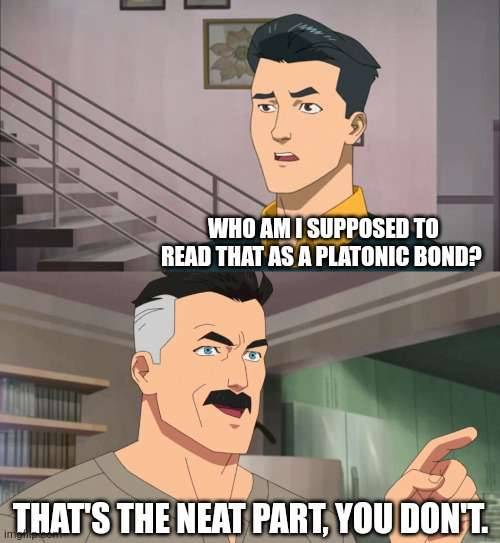
8 notes
·
View notes
Note
I think for me the thing with John is, while he can be immensely frustrating and at times disturbing and I entirely understand people who just can't get on with him, it's certainly more nuanced than him being just a bastard and Paul the "good guy". I think John's worst behavior just happens to be a lot more overt while Paul tends to be more careful keeping similar traits under the surface, and it's probably because they both share that duality of dark and light that Paul has been able to forgive a lot of what John did.
yeah i definitely agree with this! paul has also always been better at being a PR man while john never cared about that as much (which some people love abt him.) i think they’re both flawed people and i love them both BUT i can also see why people wouldn’t like one or either.
what mostly frustrates me personally is when people paint paul as a saint and john as an evil presence in his life - when obviously paul himself does not see it that way. and the reverse: when people (mostly older fans and music journalists) see john as this genius martyr and paul as a talentless hack.
with the argument that people sometimes use that paul = good guy and john = horrible bastard, it also ignores the fact that there are alleged accounts of paul being physical on at least one occasion towards both heather and linda (heathers being a first hand account and linda’s being second hand) and others who have said that paul is an incredibly controlling man, bordering on emotional abuse. not saying that any of that is actually true but i do think it’s a bit ignorant to pretend those accounts of paul haven’t been said and that there have never been any accusations against him as well. to paint the paul/john comparison as being totally black and white is just silly. especially when paul has lived for more than twice as long as john who obviously didn’t get the chance to age and continue to add to/change his own narrative like paul still can.
#i feel like i didn’t explain this very well lmao 🧍🏻#also want to emphasize that i love them both v much#like also if you just don’t vibe w one or the other i get it but some people are so over the top about it lmao#paul mccartney#john lennon#the beatles
10 notes
·
View notes
Text
Something I would have liked to see more of in Ninjago is the subversion or reversal of colour symbolism, especially in the later seasons. Throughout the middle and later seasons, it’s apparent that the writers are attempting to establish an overarching yin-yang principle to the show’s portrayal of good and evil, but there’s also a rigidity to the storytelling that prevents this from being used to its full potential.
Over-simplified, yin-yang is an concept in Chinese philosophy which states that the universe is organised into a duality of positive and negative aspects, in which positive and negative are connected and inseparable where each idea is found within the other one (there is more to it, but for this post, I’ll leave this here). In Ninjago, the first and most obvious references to this are the numerous visual references to the symbol. There’s also somewhat of an attempt to include that idea in the writing of the show, but this clashes with the storytelling. The pilots and first two seasons tell a story about hope and the eventual triumph of pure good over pure evil, typical for a kid’s show. However, after that, the writers attempt to override this and tell more nuanced stories in which the audience can think about the characters’ perspectives before deciding who the villain of the season truly is (ex. Skybound).
Thinking about it, the fact that the Overlord (and perhaps the Devourer) were established as incarnations of pure evil whereas the Golden Ninja was established as an incarnation of pure good established a precedent that really made forcing the concept of duality on the show difficult.
Moving on, Possession, Skybound, and Sons of Garmadon show a unique kind of villain, in that these seasons offer the chance to interpret who the villain is: Morro or Wu, Nadakhan or Nya, or Harumi or Lloyd. Even so, that precedent of telling a story of good vs evil where good always saves the day (and natural limits on storytelling in a poorly-planned kids’ show) doesn’t allow the audience to make much of a case for Wu, Nya, or Lloyd’s villainy; rather, the seasons miss their full potential and come off as cliché “misunderstood villain” rather than a potential hero.
Finally getting to colour symbolism, it’s established from day 1 that white represents good and black represents evil: Wu’s clothing and his dragon are white, Spinjitzu glows, and so does the Golden power, whereas Garmadon is introduced first as a shadow and then a black-skinned, monstrous character, and bad things happen at night. The only early season counterexamples I can think of are Cole being the black ninja and the Skulkin being white, but Cole’s character isn’t used to attempt to subvert the existing symbolism and the Skulkin are literal skeletons.
As the show progresses into the seasons which attempt to deal with matters of perspective, the symbolism of light and dark continues to hang over the show. There’s a lot of good ways to reverse colour symbolism and portray black or darkness as good and white or lightness as evil, and I wish Ninjago had used it, especially since the precent conflict of “pure good vs. pure evil” needs to be addressed if it’s going to be successfully reframed as a tale of balance. Not even addressing racial connotations, there was a chance to subtly explore the themes of perspective and it was just missed.
37 notes
·
View notes